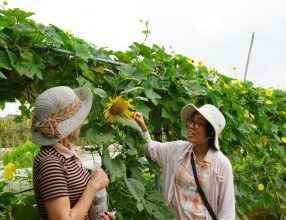
Conservation of SEED
Great news!!! Following the ALiSEA Regional Assembly Workshop, the ALiSEA Vietnam team paid a visit to Thanh Xuan commune, Soc Son district, Hanoi City, last week and distributed more seeds for the winter crop to farmers of the participatory guarantee system (PGS) group, under our member – PGS Vietnam. We are overjoyed to be able to see with our own eyes the outcomes of the flowering and fruiting seed packets provided by ECHO ASIA. The associate organic farmer, Ms. Tho, gave us a tour of the garden with great enthusiasm and showed us “the Okra tree, which had already produced fruit. She excitedly shared that she had preserved the seeds to share with the other farmers in the group, and expressed how having old plant kinds kept her able to start a fresh harvest earlier when the weather was right rather than having to go seeking plants whose origin and quality she is unsure about. She also showed how the sunflower and bitter melon seeds she planted—which were given to her hy ALiSEA from ECHO Asia—grew well, produced a lot of fruits, and were particularly resilient to the elements and pests.” Because of ALiSEA, ECHO, its funders, and its supportive […]
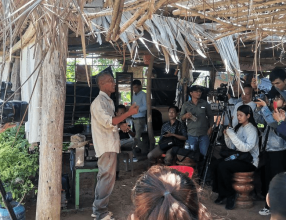
Journalist Field Visit to SSLA Key-Farmers to Explore Agroecology Practices in Battambang Province, Cambodia
Prepared by Sok Chanraksmey – DPA The Agroecology Learning Alliance in Southeast Asia (ALiSEA) network, in collaboration with the Sustainable Soil for Life Association (SSLA), organized a Journalist field trip to Battambang province, Cambodia, on July 6th 2024. There were 32 participants (Female 9), including 21 journalists from 15 different media organizations, farmers, local authorities, and representatives from GRET, ALiSEA, DPA and SSLA. The initiative aimed to deepen the understanding of local journalists on agroecology principles and approaches and share the successful agroecology initiatives in Battambang province. The activity was also a tool to promote the agroecology approaches and foster connection between Journalists, farmers, and stakeholders to create well-informed and engaging articles about agroecology. The morning session provided brief agroecology principles for further exploration of agroecology and initiatives undertaken in Cambodia. Mr. Reachna from SSLA delivered a presentation on agroecology to broaden the journalists’ understanding of the subject. Afterward, the tour proceeded to visit the vegetable farm of Mr Sin Sinoeut to explore more about the practices in the field and his experiences. In the afternoon, we visited the farm of Mr. Nim Chheang, a practitioner of agroecological diversification. His farm plants various crops for home feed and sale to […]
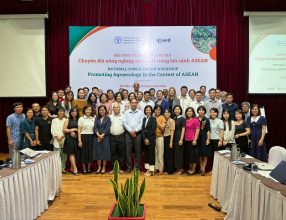
National consultation workshop to promoting Agroecology in the context of ASEAN in Vietnam
On June 7, 2024, in Hanoi, the Institute of Policy and Strategy for Agriculture and Rural Development (IPSARD) in collaboration with the Food and Agriculture Organization of the United Nations (FAO), VietDHRA, and the important partners of the project Agroecology and Safe Food System Transformation (ASSET) such as Gret, Cirad, Rudec, ALiSEA Vietnam Network organized the National consultation workshop to promoting Agroecology in the context of ASEAN in Vietnam. As one of the workshops supported by FAO, it received the attention and participation of 60 delegates representing government agencies, local authorities, embassies, research organizations, domestic and international NGOs, the private sectors, farmers came to participate for stakeholders to discuss agroecology development policies within the framework of their unification of ASEAN countries and the suitability of each country. In the morning session, relevant presentations on policies and plans to promote the development of Agroecology in Vietnam and the region were shared such as the Government of Viet Nam’s Policy on Promoting Agroecology, the ASEAN Master Plan on Rural Development and Poverty Eradication, ASEAN Guidelines on Sustainable Agriculture. Besides, our six speakers representing six pillar fields discussed state management, research organizations, local governments, enterprises, agricultural extension agencies, and project consultants under the […]
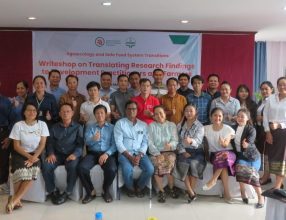
Writeshop in Laos Equips Researchers to Communicate Complex Knowledge to Farmers and Development Practitioners
Vangvieng, Laos: Ten members of The Agroecology Learning alliance in South East Asia (ALiSEA) network in Laos participated in a three-day writeshop on “Translating Research Findings to Development Practitioners and Farmers.” The event, held from May 27-29 in Vangvieng district, was organized by the Asia-Pacific Association of Agricultural Research Institutions (APAARI) as part of the Agroecology and Safefood System Transition project (ASSET). The writeshop aimed to equip participants with the skills needed to effectively communicate complex research findings to a wider audience, including development practitioners and farmers. The training focused on three key areas: Sharpening writing skills: Participants honed their ability to communicate complex scientific knowledge in a clear, concise, and engaging manner for non-specialist audiences. Processing data: The writeshop explored different techniques for effectively processing data generated from expert knowledge and practical experience, ensuring its relevance and accessibility for the target audience. Documenting knowledge: Participants learned how to document research findings in a digestible and user-friendly format, making it readily accessible and applicable for development practitioners and farmers working in the field. This writeshop has been incredibly valuable in helping me develop the skills I need to effectively communicate my research findings to a wider audience,” said Ms. Soulinda […]
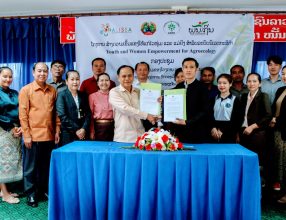
Empowering Youths and Women in Agroecology: A New Project Takes Root in Naxaythong District
The Agricultural Development and Social Assistance Association (ADSA), with a grant received from ALiSEA in 2023, is embarking on a new initiative to empower young people and women in Naxaythong District, Vientiane Capital. The project, titled “Youth and Women Empowerment for Agroecology” (YWEA), was launched in collaboration with Phan-Thin Social Enterprise (Phan-Thin) and officially endorsed by the Naxaythong District Office of Agriculture and Forestry on May 24, 2024. The YWEA project focuses on promoting sustainable agricultural practices through agroecology, with a specific emphasis on empowering young people, particularly women, to become active participants in the agricultural sector. The initiative aims to achieve this through a multi-pronged approach: Building Awareness and Capacity: YWEA will provide training and workshops to equip young people and women with the knowledge and skills necessary to adopt green and environmentally friendly agricultural techniques. This will empower them to cultivate high-quality produce while minimizing environmental impact. Fostering Collaboration: The project will establish young farmer groups, creating a platform for knowledge sharing and collaboration among participants. This will not only strengthen their individual capacities but also foster a sense of community and support. Market Linkages: YWEA recognizes the importance of market access for the success of young farmers. […]
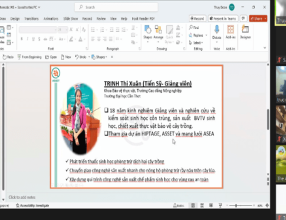
Webinar on Bio-inputs in Vietnam: Accelerating Agroecology Transition
By Thuy Thu DOAN – CISDOMA The Agroecology Learning Alliance in Southeast Asia (ALiSEA) hosted a successful online workshop titled “Initiatives to Accelerate Agroecology Transition Bio-input in Vietnam” on April 11, 2024. This event brought together 59 passionate individuals from diverse backgrounds, including farmer cooperatives, academia, NGOs, and government agencies, united by their interest in promoting a more comprehensive understanding of bio-inputs in the context of agroecology transition. Ass. Prof. Dr. Dao The Anh emphasized the crucial role of bio-inputs in sustainable agricultural production. He highlighted the need for clear understanding of available organic fertilizers, regulations for self-declaration of ecological products, and consumer awareness. He also mentioned the upcoming government draft on the use of biological products. 03 Expert Presentations: Dr. Nguyen Thi Ngoc Truc presented the historical development and innovation of biological production in Vietnam, including the isolation of bacteria and fungi. Dr. Trinh Thi Xuan discussed chemical pesticide use reduction and the development of biological solutions for pest control. She also shared technical knowledge on rapid-transfer bio-preparation production. MSc. Mai Thi Lan Huong showcased the effectiveness of using indigenous microorganisms, highlighting their advantages and successful implementation in farmer cooperatives. Participants actively engaged in discussions, raising questions about […]
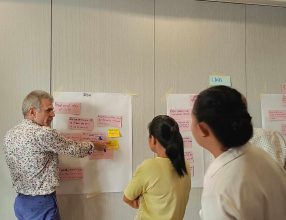
ALiSEA Strengthens Knowledge Sharing with Case Study Writing Training
ALiSEA recently held a three-day training workshop on writing case studies, taking place from April 1-3, 2024, in Vientiane. The workshop aimed to equip participants with the skills and knowledge to develop effective case studies, fostering knowledge sharing amongst ALiSEA members. The training, led by Francois ENTEN, GRET Headquarter, welcomed 14 participants from ALiSEA member across Laos, Cambodia, and Vietnam. The curriculum focused on three key objectives: Shared Understanding: Establishing common ground on the purpose and format of case studies, along with the production process. Participants gained valuable insights through feedback from ALiSEA knowledge managers, ensuring consistency and quality in future case studies. Selecting a Compelling Subject: Equipping participants to identify specific areas within their work – a field, project, situation, technique, method, or approach – that would serve as the foundation for their case studies. This focus on real-world scenarios ensures the cases will be relevant and practical. Building a Strong Case: Participants learned how to construct a clear and well-supported argument within their case studies. The training emphasized the importance of utilizing documents, data, and results readily available to the participants and their teams. This data-driven approach ensures the credibility and validity of the case studies. By strengthening case study writing […]
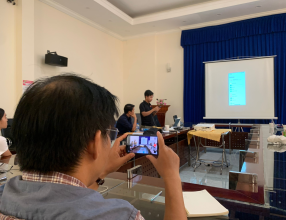
ALiSEA organized the second training on Photo and Video production for members in Southern Vietnam
By Nguyễn Thị Trang – PHANO In the framework of the ASSET project, and supported by Dong Thap’s Department of Agriculture and Rural Development, the Agroecology Learning Alliance in Southeast Asia (ALiSEA Vietnam), in collaboration with GRET, Vietnam Rural Development Science Association (PHANO), the Northern Mountainous Agriculture and Forestry Science Institute (NOMAFSI) successfully held a second training session on photography, podcasting, and video production using smartphones for 11 participants from member organizations. This three-day workshop, held from March 12 to 14, 2024, in Dong Thap, Vietnam, catered to the growing demand for these skills among ALiSEA’s members in Southern Vietnam. The training aimed to equip participants with the following skill sets: Basic knowledge and techniques in mobile photography, podcasting, and short video production Creating short podcasts that incorporate images Understanding the process of scriptwriting and short film production Promoting communication and knowledge sharing among member organizations regarding the transition towards transparent food systems through agroecology With the support of GRET and under the guidance of trainers Mr. Pat Sovann (Regional Board Member of ALiSEA Network and National Coordinator of the ASSET project in Cambodia) and Mr. Oeu Vearyda (Communication Officer of ASSET project), the training session was tailored to the […]
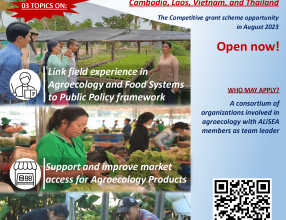
2023 Small Grant Facility Awarded to ALiSEA Network’s Members in Southeast Asia
The Agroecology Learning Alliance in Southeast Asia (ALiSEA) successfully concluded its 2023 Small Grant Facility, awarding funding to 9 organizations across Laos, Cambodia, and Vietnam. This initiative, open from August to October 2023, aimed to support innovative projects addressing three critical themes: Supporting and improving market access for agroecological products. Linking field experience in agroecology and food systems to public policy frameworks. Empowering and strengthening the involvement of youth in agroecology initiatives. ALiSEA received 30 proposals, demonstrating strong interest in advancing agroecology across the region. These proposals originated from various organizations, with 11 from Laos, 9 from Cambodia, 9 from Vietnam, and 1 from Thailand. Notably, the topics of “Improving market access” attracted the most proposals (15), followed by “Empowering youth” (11) and “Linking field experience to policy” (5). There are a total of 17 main evaluators, plus an additional 2 evaluators from CIRAD (6 of whom are women), representing a diverse range of stakeholders on the selection committee including Board Members from Laos, Vietnam and Cambodia, and representatives from GRET, Uni4Coop, IRD, and Chrysalis Consulting. Following a rigorous selection process, ALiSEA awarded grants to 9 organizations: Laos: Topic: Re-enchanting Agriculture for Youths through an Organic Network, Ban Suan Ai […]
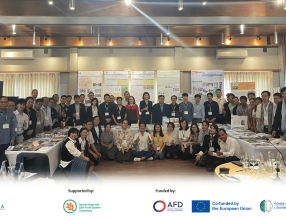
ALiSEA Network organized its First Regional General Assembly
March 2024, Laos – The Agroecology Learning Alliance in South East Asia (ALiSEA) successfully carried out its Regional General Assembly in Luang Prabang. Held from March 26 to 28, 2024, the event brought together 65 participants (20 women) of the ALiSEA network from Cambodia, Laos, Vietnam and Thailand, working in the field of agroecology across the country, such as local and international nongovernmental organizations, farmers’ organizations, universities and research centers. The workshop was co-organized by GRET, and the national Board Members of the 3 countries (From Laos: CLICK, SAEDA, NUoL-FAG, RDA from Vietnam: NOMAFSI, CARES, CASRAD, PHANO, CISDOMA from Cambodia: DPA, Ecoland, CFAP and DCA). In his opening speech, Mr. Thongdam Phongphichith, Director of SEADA, stated that “A heartfelt welcome to all of you attending the ALiSEA 2024 Regional General Assembly here in Luang Prabang, Laos! It brings me immense pleasure to see so many familiar faces and new ones joining us today. This assembly is a fantastic opportunity to come together, share our experiences, and work collaboratively towards a brighter future. And what better place to do that than in the beautiful Luang Prabang, a UNESCO World Heritage city steeped in history and culture. I am confident that the […]
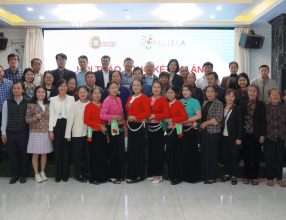
Farmers became more aware of agro-ecological practices during the project experiment in Vietnam
On March 21, 2024, in Ha Nam province, the Project Summary Workshop of “Eco-weed control: a participatory experiment on PGS/organic vegetable farms in Ha Nam and Hoa Binh provinces” took place successfully. The workshop was organized by the Center for Agroecology (CARES) within the framework of The Agroecology Learning Alliance in South East Asia (ALiSEA) Small Grant Fund in 2022 – a part of the project of Agroecology and Safe Food System Transitions in Southeast Asia (ASSET Project) for its members. The workshop was attended by around 60 participants, including representatives of local authorities of Ha Nam and Hung Yen provinces, representatives of the ALiSEA Network and some ALiSEA’s members, and around 30 farmers from 3 intergroups: Thanh Xuan, Luong Son, Trac Van under PGS Vietnam. Outstanding results of the project: Experimental arrangement and practical evaluation of two groups of farmers have demonstrated the effectiveness of mulching and limited tillage-plowing. Soil quality is significantly improved, which has contributed to increased productivity in farming for farmers, and significantly reduced their labor time, specifically manual weeding time. Changed farmers’ awareness: Farmers participating in the project expressed excitement and desire to accompany scientists to apply effective ecological farming methods to production. At the […]
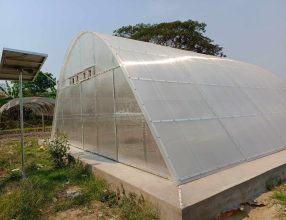
Sola-Dome Brings New Hope to Thongmung Organic Cooperative
The Thongmung Organic Cooperative in Vientiane Capital recently received a welcome boost with the installation of a new sola-dome, a small grant project funded by ALiSEA and implemented by CDEA. This innovative structure utilizes solar power to create a controlled environment for processing agricultural products, a first for cooperatives within the capital city. Mr. Khampha, a representative involved in the project, expressed his enthusiasm, stating, “This solar-dome is the first one installed for the cooperative in Vientiane capital, so it will become a center for the processing of the products of the cooperative and Thongmung Village.” He envisions the sola-dome not only enhancing processing efficiency but also fostering knowledge exchange within the community. Ms. Khammone Luanglat, President of the Thongmung Organic Cooperative, echoed Mr. Khampha’s sentiments. She highlighted the cooperative’s existing “One district one product” certification and emphasized how the sola-dome will expedite product processing. Furthermore, Ms. Luanglat expressed aspirations to utilize the structure as a “center for learning and sharing with other people,” promoting knowledge dissemination and collaboration within the agricultural sector. The sola-dome’s arrival marks a significant step forward for the Thongmung Organic Cooperative, promising to streamline processing, empower knowledge sharing, and ultimately contribute to the cooperative’s continued […]
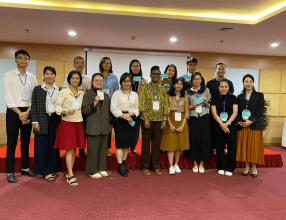
Towards Inclusive Agricultural Development: a Social and Gender Equality Training in Vietnam
By Nguyễn Thị Trang – PHANO A training course on social and gender equality was conducted by experts from the Stockholm Environment Institute (SEI) and co- organized by GRET and the Vietnam Rural Development Science Association (PHANO) with a participation of around 20 trainees from ASSET partner organisations and members of the Agroecology Learning Alliance in Southeast Asia (ALiSEA) in Vietnam on 13-14 November 2023 in Hanoi, Vietnam. The training was designed with the key goal of strengthening capacity and in-depth understanding of national partners on gender, integrating gender equality and social justice into the implementation of the ASSET project at all levels. The event also aimed to address the under representation of women in Vietnam’s agricultural sector. The training’s methodology was hands-on and participatory, demonstrated by various activities that helped trainees gain a deep understanding and knowledge about social and gender equality. It included activities like role-playing and discussions on gender-responsive and socially inclusive environmental design. Mrs. Dong Thi Na, ASSET Project Coordinator for Dien Bien province shared her observations on gender role in the locality she worked at. “Currently, the role of women in rural and mountainous areas is not taken seriously. They have very few opportunities, many […]
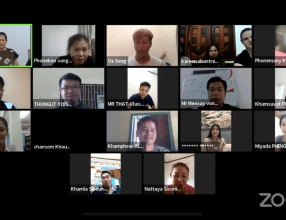
Engaging Youth in Sustainable Agriculture through Agroecology in Laos
By Chansom Khounsombath – CLICK ALiSEA in Laos organized a thematic talk on “Youth and Agroecology” on October 20th, 2023. The talk was presented by three guest speakers from different sectors – Lao Farmer Network, People with Disabilities Development Association (PDDA) of Xiengkhouang and Youth from KubBanKan Project. The thematic talk was well-attended by 40 participants, who joined via Zoom and Facebook live streaming. The speakers’ presentations were informative and insightful, and the participants have experienced different ideas about agroecology activities and youth participation. The first speaker, Mr. Vaxeng, KubBanKan Project implementor, shared the experiences of his project. The KubBanKan Project aims to develop the hometown in relation to agricultural and environmental aspects by collaborating with local villagers to find out the community’s problems and make plans together for agricultural training. Fermented feed from banana bunches, for example, which farmers will benefit from it for animal feed and even sell it to animal farms. Mr. Vaxeng also expressed that working with the community needs comprehensive understanding about problems, possible solutions, farmer daily routine, and dialect language. These factors are significant to implement the project activities involving villager participation. The second speaker, Ms. Phonekeo Vangna, Business development officer of Lao […]
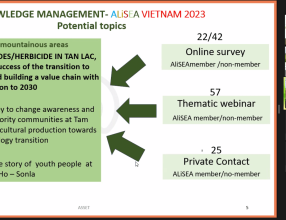
Webinar on initiatives to accelerate Agroecology transition in the Rice production – Delta Areas of Viet Nam.
On November 17, 2023, The Agroecology Learning Alliance in Southeast Asia (ALiSEA) organized an online workshop entitled initiatives to Accelerate Agroecology transition in the in the Rice production – Delta Areas of Viet Nam attended by 30 participants from academies, NGOs, government agencies and businesses. The selected initiatives were presented by the speakers representing various actors involved in AE transition promotion including research institution and companies. The 1st paper was presented by Mr. Le Thanh Phong, Vice director of Climate Change Institute- An Giang University, on the necessary to promote research on flood-resistant rice varieties from rice genetic resources currently stored at institutes and schools. This helps regenerate and improve suitable rice varieties, develop favorable rice cultivation models, and bring profits to farmers without relying too much on chemical fertilizers. “He said: In the context of climate change which is having a major impact on the Mekong Delta region, Floating rice variety ( indigenous rice varieties) can be considered a traditional farming solution capable of adapting to climate change, especially in flood environments; creating diversification in agricultural production, has great potential to bring sustainable income to farmer, especially supporting effective water management in the Mekong Delta region. The planting rice […]
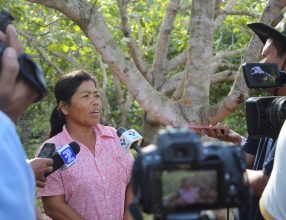
Field Visit Catches Journalists’ Interest to Report on Agroecology in Cambodia
By Thol Buntha – DPA Seven journalists from different local media agencies, including radio, television, newspapers and online news media, participated in a field visit to the flagship site of Agroecology and Safe Food System Transitions (ASSET) project in Rovieng district, Preah Vihear province on 18 November 2023. The field visit was organized by the Agroecology Learning Alliance in Southeast Asia (ALiSEA) team in Cambodia with aims to share knowledge and practical experiences of agroecology at the field, to connect journalists with farmers, agriculturists and local authorities, and to encourage them to report about agroecology concepts and awareness to a broader audience. The participants were firstly introduced to agroecology and ASSET project by Dr. Kong Rada, ASSET Project’s National Coordinator. Then, they were presented the demonstration of soil erosion (with different types of soil) by the ASSET’s project team – marking the positive impact of agroecology’s impact on soil health. The activity was followed by the visits to field research sites of the organic rice paddy, cassava cultivation and cashew nut protection by using agroecological methods, through which journalists had opportunity to listen to farmers’ presentations and ask them questions. The field visit was a significant activity to raise awareness […]
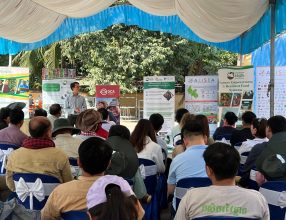
CASIC Embarks on a Milestone Field Visit to SSLA, an ALiSEA Network Member, in Battambang, Cambodia
By Thol Buntha – DPA A delegation from Steering Committee and Executive Board Members of Cambodia Conservation Agriculture and Sustainable Intensification Consortium (CASIC) including participants from relevant government’s ministries, Provincial Departments of Agriculture, Forestry and Fisheries (PDAFF), development partners and private sectors participated a field visit to engage and observe agroecological practices at Sustainable Soil for Life Association (SSLA), an Agroecology Learning Alliance in Southeast Asia (ALiSEA)’s member, in Battambang province on 13 December 2023. The main objectives of the field visit were to build a foundation for future collaboration between CASIC and ALiSEA to enhance the agroecology transitions in Cambodia, to increase CASIC’s understanding of ALiSEA’s role in facilitating knowledge exchange among its members, and to demonstrate how ALiSEA could contribute to policy development on agroecology at national and regional levels through evidence creation and other means. The delegation of 35 members, led by H.E. Om Kimsir, Secretary of State of Ministry of Agriculture, Forestry and Fisheries (MAFF) and Chair of CASIC Steering Committee, were comprised of relevant government’s ministries and institutions including Ministry of Agriculture, Forestry and Fisheries (MAFF), Ministry of Women’s Affairs, Cambodia Chamber of Commerce, and Council for Agricultural and Rural Development (CARD). H.E. Om Kimsir […]
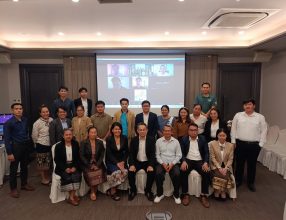
ALiSEA Workshop: Empowers ALiSEA members with Knowledge and Advocacy Tools for Agroecological Certifications
Vientiane, Lao PDR (December 20, 2023): the Agroecology Learning Alliance in Southeast Asia (ALiSEA) hosted a crucial workshop in Vientiane, Laos. This one-day event, held at the Grand Hotel, brought together over 30 participants, including ALiSEA members, government officials, farmer organizations, and private sector representatives, to delve into the world of certifications for agroecological products. The event commenced with an introduction to ALiSEA and its unwavering commitment to fostering agroecological practices in the region. As Manivanh Aliyavong, an ALiSEA representative, eloquently stated, “We believe that agroecology is not just about organic farming; it’s about building a holistic system that respects the environment, empowers farmers, and ensures food security for all.” The core of the workshop unfolded through a series of engaging panel discussions featuring renowned experts from across the agricultural landscape. Representatives from the Department of Agriculture (DOA) – Ministry of Agriculture and Forestry (MAF), Civil Society Organizations (CSOs), farmer cooperatives, and the private sector each shed light on specific certification schemes, offering invaluable insights into their intricacies and practicalities. Panel 1: Led by a representative from the DOA, unraveled the complexities of Lao Organic certification and Good Agricultural Practices (GAPs), highlighting the rigorous standards and meticulous inspection processes involved. […]
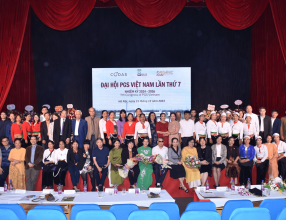
7th Congress of PGS Vietnam
[Vietnamese below] By Trang Nguyen – PHANO On December 15, 2023, a representative of the Vietnam Rural Development Science Association (PHANO) – Vietnam Board of Members of the ALiSEA network participated and extended congratulations at the 7th Congress of Participatory Guarantee System Vietnam (PGS Vietnam) in Hanoi. The event was attended by more than 200 delegates from diverse sectors, which included 150 organic farmers belonging to the system, and was graced by the presence of many members of the ALiSEA network. These members were recognized for their contributions to the development of the system, such as the Agricultural Development Denmark Asian organization (ADDA Vietnam). During this important event, the film “The Journey of Trust” about 15 years – the emotional journey of farmers and system initiators in 2008. This is considered a special milestone for small-scale organic farmers in the provinces of Hanoi, Vinh Phuc, Bac Ninh, Bac Giang, Hai Phong, Hoa Binh, Tuyen Quang, Lao Cai, Ha Tinh in Vietnam due to the introduction of this Participatory Guarantee System published and linked private sectors building the value chain bringing the first organic productions to consumers, within the framework of the “Organic Agriculture Development Project” sponsored by the Agricultural Development […]
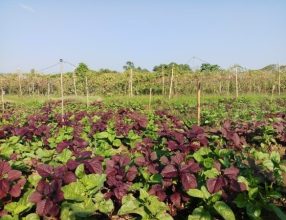
Small Grant Facilitation Awarded to ALiSEA Network Members in Southeast Asia
ASSET Project is pleased to announce that seven members of the Agroecology Learning Alliance in Southeast Asia (ALiSEA) Network have been awarded the Small Grant Facilitation (SGF) in 2022. These grants were based on a Call for Proposal that focused on three essential topics aimed at promoting agroecology and food systems in the region. The ALiSEA Network, consisting of organizations and individuals committed to sustainable agriculture and food systems, plays a pivotal role in fostering collaboration and knowledge sharing. The Small Grant Facilitation program was designed to empower ALiSEA members and their partners, supporting them in their efforts to address the pressing challenges faced by agricultural communities in the Sub-Mekong Region. The grants were awarded to two members from Cambodia, two members from Laos, and three members from Vietnam. Each initiative addresses a specific topic, aligning with the goals of the Call for Proposal and contributing to the advancement of agroecology and sustainable food systems. In Cambodia: HEKS Cambodia co-implementer with Agrismart Innovation Co., ltd and Kompong Thom’s PDAFF will work with private sector and local government to support cashew producers in Kompong Thom province. The intiative’s focus is on training farmers in agroecological practices to mitigate the impact of […]
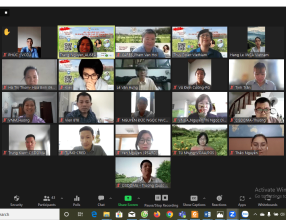
Accelerating Agroecology in Vietnam’s Northern Mountains: Learning from Diverse Initiatives
By Thuy Thu DOAN – CISDOMA On October 6th, 2023, the Agroecology Learning Alliance in Southeast Asia (ALiSEA) convened a vibrant online workshop titled “Initiatives to Accelerate Agroecology Transition in the Northern Mountainous Areas of Vietnam.” This event brought together 55 passionate individuals from academia, NGOs, government agencies, and businesses, united by a common goal: fostering a sustainable agricultural future for Vietnam’s mountainous regions. Dr. Dao The Anh, in his opening remarks, emphasized the critical role of ALiSEA in facilitating knowledge exchange and collaboration. He highlighted the growing significance of agroecology within Vietnam’s rural development strategy, aiming for a holistic transformation of agriculture, the food system, and the wider economy. He stressed the need for technical advancements and underscored the wealth of agroecological initiatives within ALiSEA, waiting to be shared and scaled. The workshop’s core focus was exploring diverse initiatives driving agroecology transition in these mountainous areas. Pre-selected speakers, representing various stakeholder groups, showcased their impactful endeavors. MSc. Dinh Trung Kien from CISDOMA shared how a landscape approach fosters agroecology in Hoa Binh province, empowering ethnic minority farmers to build resilient livelihoods. Dr. Nguyen Thi Ngoc Dinh from Vietnam National University of Agriculture presented a study on a value chain […]
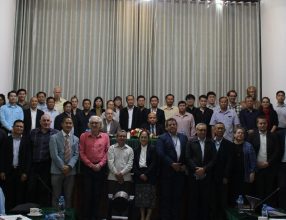
Sub-Sector Working Group on Agroecology Holds Inaugural Meeting in Laos
Vientiane, Laos – The Sub-Sector Working Group on Agroecology (SSWG-AE) held its inaugural meeting on November 24, 2023, at the MAF’s Meeting Hall in Vientiane Capital. The meeting brought together key stakeholders from government agencies, development partners, and international organizations to discuss the importance of agroecology for sustainable food system transformation in Laos. Established in October 2023 under the auspices of the Ministry of Agriculture and Forestry (MAF), the SSWG-AE aims to facilitate and coordinate the sharing of lessons learned on agroecology, formulate Laos’ vision of sustainable landscape management approaches, and disseminate this vision to the global community. Chaired by the Department of Agricultural Land Management (DALaM) and Agence Francaise de Developpement (AFD), the SSWG-AE brings together representatives from government agencies, development partners, and international organizations, fostering a collaborative environment for advancing agroecology in Laos. The inaugural meeting served as a crucial forum for introducing the SSWG-AE, its objectives, and its mandate to its members. Participants delved into the concepts, practices, and challenges of agroecology in Laos, gaining a shared understanding of this transformative approach to sustainable agriculture. Stocktaking of policies related to agroecology and food system resilience provided insights into the current landscape and identified areas for further development. […]
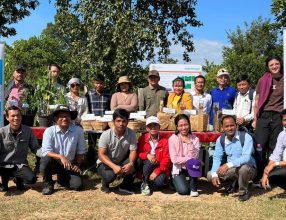
Agroecology in Action: ALiSEA Members Embark on a Field Visit to Cambodia
The Agroecology Learning Alliance in Southeast Asia (ALiSEA), a network committed to fostering agroecological practices across the region, organized a field visit for its members in November 2023. This immersive experience aimed to showcase agroecology in action, highlighting its transformative potential in Cambodia. On November 20th and 21st, 18 ALiSEA members, including 6 women, from 17 organizations embarked on a journey to the Cambodian Conservation Agriculture Research for Development Centre (CARDEC) and the ASSET Flagship site, two hubs of agroecological innovation. The objectives of the field visit were twofold: to share valuable agroecology knowledge and experiences among ALiSEA members and to showcase the tangible outcomes of agroecology field experiments and the ASSET project implemented in the flagship site. At CARDEC, participants delved into the center’s extensive research on agroecology, gaining insights into its efforts to promote sustainable agricultural practices across Cambodia. They were also given a tour of the research station, where they witnessed a variety of agroecology trials and demonstrations, providing hands-on exposure to the practical applications of agroecology. “The CARDEC research station is a testament to the power of agroecology to transform agriculture,” remarked one participant. “Seeing the positive impact of these practices firsthand is truly inspiring.” The […]
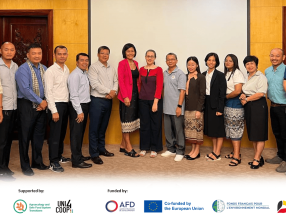
ALiSEA Regional Board Members Workshop in Vientiane, Laos
In an impactful gathering, the Agroecology Learning Alliance in Southeast Asia (ALiSEA) network brought together its regional board members for a strategic workshop in Vientiane, Laos, from November 6 to 11, 2023. It was aimed at enhancing knowledge management, improving communication strategies, and planning for the Regional General Assembly in March 2024. The workshop was attended by 18 participants, 7 women, including board members from Vietnam (CARES, PHANO, CISDOMA), Laos (SAEDA, CLICK, RDA, NUoL), Cambodia (DPA, DCA, Ecoland, CFAP), and GRET. The workshop had several objectives, including: Work on knowledge management and production, including case study templates and programs in each country; Conduct communication training on Facebook management and website article writing; Prepare the regional general assembly to be held in March 2024; Organize a working session by CDE, on the ALiSEA Knowledge Hub progress, perspectives, and ownership; During the workshop, participants discussed the ALiSEA Network identity by brainstorming on what best represents the network, the values ALiSEA carries as a network, and its missions. These ideas will be used to revise the ALiSEA re-branding effort as part of the improvement of the communication strategy and tools. “Eight years have provided us with valuable insights into the challenges and opportunities […]
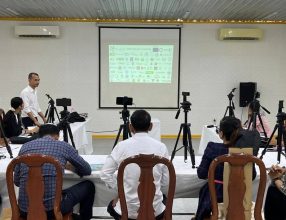
ALiSEA organized 2nd Training on Photo and Video Production in Laos and Cambodia
The ALiSEA recently organized its second training on photo and video production in Laos and Cambodia. The training took place from August 8-10, 2023, in Vientiane, Laos, and Takeo province, Cambodia, and was attended by 20 participants from both countries. This training is a continuation of the previous training “Smartphone Lens on Field to Promote Agroecology and Safe Food” which covered a wide range of topics related to photo and video production, including: Basic photography and videography techniques Storyboarding and composition Sound recording Editing and post-production The participants also had the opportunity to go on field trips to practice their skills. In Laos, they visited the Phomalok integrated farming, while in Cambodia, they visited the integrated farming and chicken feed production supported by the Tramkak Union of Agriculture Cooperative. The training was a great success and the participants learned a lot about photo and video production. They also had the opportunity to network with other professionals in the field. I’m excited to learn video editing, even though I don’t have any prior experience. This is a great opportunity for me to develop new skills and apply them to my work.” – Nilaphay, a participant from Laos. A participant from Cambodia […]
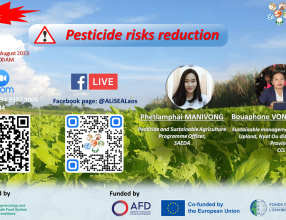
Pesticide Risk Reduction Talk in Laos
ALiSEA in Laos organized an online thematic talk on “Pesticide Risk Reduction” on August 25, 2023. The talk was presented by two guest speakers from the SAEDA and CCL, two organizations that work on pesticide management in Laos. The first speaker, Ms. Phetlamphai Manivong, Pesticide and Sustainable Agriculture Programme Officer at SAEDA, gave an overview of pesticide risk behavior. She discussed the different types of pesticide risk, including health risks, environmental risks, and economic risks. She also highlighted the importance of pesticide risk reduction and how to keep safe from pesticides. Ms. Phetlamphai explained that pesticide risk can be caused by the misuse of pesticides, such as using too much pesticide, using the wrong pesticide, or not following the safety instructions. She also said that pesticide risk can be caused by the environmental exposure to pesticides, such as through water, air, or soil contamination. Ms. Phetlamphai stressed the importance of pesticide risk reduction. She said that there are many things that can be done to reduce pesticide risk, such as: Using less pesticide Using more targeted pesticide applications Wearing protective clothing when handling pesticides Storing pesticides properly Disposing of pesticides properly The second speaker, Ms. Bouaphone Vongkhamsone, Sustainable Management […]
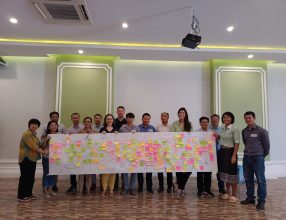
“TOWARDS AN AGROECOLOGY TRANSITION” ALISEA REGIONAL BOARD MEMBERS MEETING IN CAMBODIA
June 2023, Siem Reap, Cambodia – The Agroecology Learning Alliance in South East Asia (ALiSEA) successfully concluded its Regional Board Members Meeting in Cambodia. Held from May 29 to June 01, 2023, the event brought together 17 participants who were board members of institutions of ALiSEA networks from research centers (CARES, NOMAFSI) , academia (NUoL), farmers’ federation (CFAP), social enterprise (Click), national and international non-governmental organizations (DPA, DCA, RDA, SAEDA, CISDOMA, PHANO and GRET) in Cambodia, Laos, and Vietnam. Two organizations guests were also invited to take part in the discussions: Uni4coop, as technical and financial support provided to ALiSEA in Cambodia and Mediaseeds, as support for ALiSEA’s communication strategy. ALiSEA’s primary objectives for the meeting were to build networks and facilitate effective communication among the ALiSEA Board Members in the region. Additionally, the meeting aimed to remind all participants of the history of ALiSEA and to look forward to its future. Lastly, the gathering sought to develop a common vision for the internal structure and management of the ALiSEA network in the region. Throughout the meeting, board members engaged in various activities and discussions that fostered network building and strengthened communication among the participants. By sharing experiences, insights, and […]
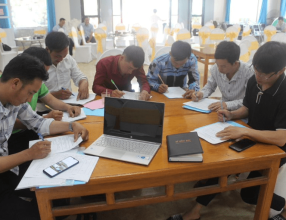
Strengthen the baseline- project connection with ALiSEA’s network to promote agro-ecological transformation and Safe food system
From May 15 to 20, 2023 at Tam Duong, Lai Chau, CISDOMA, in collaboration with the local partner and experts from NOMAFSI, organized a training of trainers (TOT) on “Agroecology and solutions for Agroecological (AE) transition in local context”. Attending this training are 35 participants from Lai Chau provincial Agricultural and Rural Development Department, Women Union; Thai Nguyen University (Lao Cai Branch); staff from Tam Duong District agencies, and commune leaders. ALiSEA’s National Board member in Vietnam attended the training and delivered an introduction on the Network; facilitated discussion for strengthening connection, on topics and ways to enhance learning and sharing between the project, local network with ALiSEA and other members. During the trainings, several modalities of AE practices and ecological techniques ( bio-bed livestock, vermicomposting, bio- pesticide) were introduced. A field visit was also conducted with exposure to good practices in Tan Uyen district ( bio-bed chickens and crown; Bamboo Rat; Passion fruit and watermelon), where VAC model (garden- pond-barn) and slopping land management techniques have been successfully adopted and helped improve household income, better adapt to climate change. The TOT is the first activity of a series of trainings for staff of local partners in Lai Chau, Lao […]
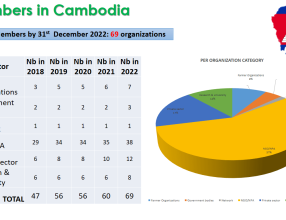
ALiSEA Online Orientation to Interested Organizations
The online ALiSEA Orientation was conducted with 23 representatives from four Unions of Agricultural Cooperatives (UACs) and 13 local non-governmental organizations (NGOs) on 15 March 2023. The meeting aimed at raising awareness of ALiSEA to relevant actors working in the field of agroecology. Through the session, participants learned about ALiSEA’s vision, goals, structure, interventions, small grant facility and especially how they could apply for a membership of ALiSEA. All questions from participants were about clarification on how to request to be an ALiSEA member. Following the event, four local NGOs and three UACs submitted letter of interests requesting to be ALiSEA member while another UAC and some other local NGOs are preparing the letter and will submit in the following months. The local NGOs and UACs that have submitted the letter of interest are listed as follows: NGOs Village Support Group (VSG) Akphivath Neary Khmer Organization (ANKO) Bayon Education and Development (BED) Youth Council of Cambodia (YCC) UACs Battambang Union of Agricultural Cooperatives (BUAC) Preah Vihear Mean Chey Union of Agricultural Cooperatives (PMUAC) Tramkak Union of Agricultural Cooperatives (TrUAC)
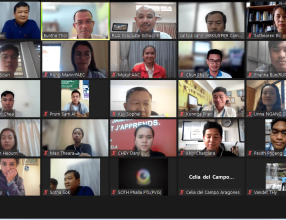
Cambodia ALiSEA Online Thematic Sharing Workshop
Cambodia ALiSEA Board Members organized the online thematic sharing workshop for 39 students and representatives from different organizations under the theme “Setting the scene of agroecology in Cambodia” on 27 March 2023. The objective of the event was to present and share knowledge and experiences about ALiSEA network and its future pathway on agroecology (AE) and safe food systems in Cambodia and key principles and practices of AE. Speakers in this workshop were as the following: 1-Mr. Thol Buntha, DPA-ALiSEA National Secretariat Officer (DPA), presented “Introduction to the ALiSEA Network” in which he highlighted the network vision and goals, structure, members, interventions, action plan 2023, funding partners, small grant facility and the process to become ALiSEA members. 2-Ms. Celia Del Campo Aragones, ALiSEA Theory of Change, Monitoring & Evaluation Coordinator (DCA), shared her knowledge and experience on “Exploring key principles and practices of agroecology”. Her presentation covered introduction to agroecology, sustainable food systems, linkage FAO elements and HLPE principles, FAO-HLPE elements of agroecology, ALiSEA Cambodia agroecology principles and evolution of the ALiSEA principles. 3-Mr. Hou Sorith, ALiSEA Knowledge Management Coordinator from Ecosystem Services and Land Use (ECOLAND), presented “ALiSEA network future pathway to AE and safe food systems in Cambodia” […]
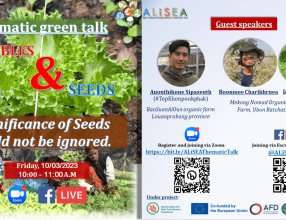
ALiSEA online thematic green talk in Laos: “Vegetables & Seeds: The significance of Seeds could not be ignored.”
The ALiSEA online thematic green talk in Laos was held on Friday 10/3/2023 on “Vegetables & Seeds: The Significance of Seeds could not be ignored” via Zoom and live streaming on Agroecology Learning Alliance in Laos Facebook page. In this event, the guests were Mr. Anouthikone Sipaseuth from the BanSuanAiOun organic farm (Luang Prabang province, Laos) and Ms. Jaruwan Supolrai & Mr. Boonmee Charikhruea from the Mekong Nomad Organic Farm (Ubon Ratchathani, Thailand). They shared their knowledge and experience with over 50 participants such as: who attended online through Zoom and ALiSEA Laos’s FB page live streaming. Here are some sharing between Laos and Thailand Farmers: BanSuanAiAoun Organic is supplying vegetables to hotels and restaurants with over 80 varieties, producing seeds, integrate farming training. Mr. Anouthikone said that “I started produce organic seed since 2019 due to it’s very hard to find it in Laos just only imported from Thailand which are very expensive. So, I thought I would like to produce them by myself. Currently, I can produce 8 types of lettuce, beans seed and tomatoes seed.” Seeds that normally sell in the market are and cannot be propagated again. When farmers start a new season each time, we […]
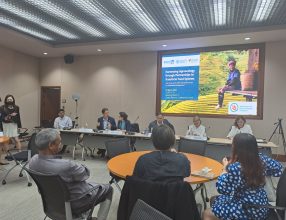
ALiSEA participation to the Asia and Pacific Forum on Sustainable Development 2023
From 28 to 30 March 2023, a delegation of the ALiSEA network participated for the first time to the Asia Pacific Forum on Sustainable Development. The Asia-Pacific Forum on Sustainable Development (APFSD) is an annual, inclusive intergovernmental forum to support follow-up and review of progress on the 2030 Agenda for Sustainable Development and the Sustainable Development Goals (SDGs) at the regional level, while serving as a regional preparatory meeting to the High-Level Political Forum (HLPF). The 10th APFSD was organized from 27-30 March 2023 under the theme “Accelerating the recovery from the coronavirus disease (COVID-19) and the full implementation of the 2030 Agenda for Sustainable Development at all levels in Asia and the Pacific” in Bangkok, at the United Nations Conference Center (UNCC). The ALiSEA delegation, composed of the Policy Dialogue Coordinators of the Board of Members from ALiSEA Laos, Cambodia and Vietnam, as well as the Policy Dialogue Expert from GRET, was able to join this major event. ALiSEA representatives could gain a regional perspective on the implementation of the 2030 Agenda for Sustainable Development by identifying regional trends and learning from best practices and lessons learned shared by a high diversity of participants. The APFSD was a rich occasion for the Network to engage […]
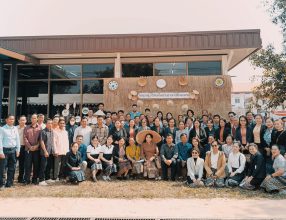
Lao Farmer Network: The Biggest Farmer Group in Lao PDR
The annual meeting of the Lao Farmer Network is the largest gathering of farmers in Laos that takes place every year. the Lao Farmers Network brings together 173 farmer organizations from 16 provinces with the purpose to strengthen cooperation among smallholder farmers. For this occasion of the general assembly, 173 members production groups met in Vientiane capital. Since the beginning of the COVID-19 pandemic in November 2019, the situation of travel, meeting/exchanging has been difficult, most of activities have to be organized online. On February 1, 2023, the “Annual General Assembly of the Lao Farmer Network (LFN)” was held at the Farmers, Agribusiness and Market Engagement Center (FAME), Vientiane Capital, with more than 80 participants from farmers networks representatives, governments, private sectors, and development partners such as LURAS, FAO, UNDP, ALiSEA Network, PISCA, and others. The event started with a poster’s session of 15 partners organizations and farmer representatives who presented and shared their experience on various of topics such as organic fertilizer business of Thakhor group, spring onion seed business, a new rice farming system, integrated pest control, producer public private sector partnership development, agriculture innovation competition scheme, etc. (The posters can be downloaded here) After that, 2022 activities […]
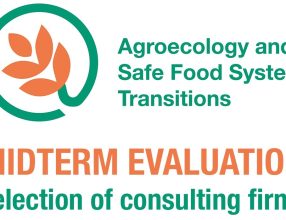
ASSET Project Midterm Evaluation – Call for expression of Interest
GRET is a French NGO founded in 1976, whose activities range from the field to policy-making in the fight against poverty and inequality. GRET has been present in more than 30 countries, in a variety of fields / topics to provide sustainable and innovative solutions to the united development process. GRET has been operating in Vietnam and Cambodia since 1988 and in Laos since 2004. The GRET has received a financing from the Agence Française de Développement and the European Union and intends to use part of the funds thereof for payments under the following project Agroecology And Safe food Systems Transition (ASSET) in South East Asia. ASSET project is implemented by GRET as the general coordinator, in a strong articulation with CIRAD in charge of the scientific coordination, in partnership with a consortium of 23 International/European/National Institutions and Organizations and 2 United Nations Agencies. The Asset project aims to capture the multiple dimensions of the Agroecology concept including food system ones and intends to support multilevel bottom-up advocacy and policy transformation approach (from local to ASEAN level) and promote Agroecology and food systems common position at ASEAN level. GRET is looking for consulting firms to undertake the first midterm […]
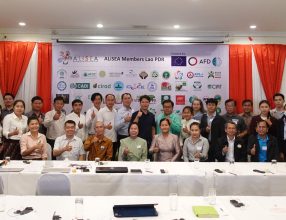
ALiSEA National General Assembly in Lao PDR, 29 November 2022
Vientiane, 29th November 2022, National General Assembly Workshop for ALiSEA Laos took place at the LaoTel Hotel. The National General Assembly aims to present the key achievements of the network in 2022, to consult members on internal structuration and to set up the main action plan of the network in 2023. The event brought together 39 participants of the ALiSEA network, working in the field of agroecology across the country, such as local and international nongovernmental organizations, farmers organizations, networks, academic and government institutions. The workshop was co-organized by GRET, CLICK, MHP, NUoL-FAG and RDA, as part of the ASSET project funded by the French Agency for Development (AFD), the European Union (EU), and the French Facility for Global Environment (FFEM). The General Assembly is ALiSEA’s annual event through which it’s members can review the progress of the network and provide their feedback to ensure that the network is working in the right direction that would benefit each member. “I am very proud and glad to be a representative of the ALiSEA Network that was established in 2015. Since that time, our members have become more diverse, with various stakeholders from the private sector and farmers’ groups. We have been unable to […]
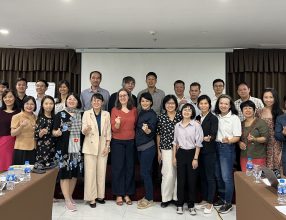
ALiSEA National General Assembly in Vietnam, 29 November 2022
Hanoi, 29th November 2022, National General Assembly Workshop for ALiSEA Vietnam took place at the Adonis Hotel. The National General Assembly aims to present the key achievements of the network in 2022, consult members on internal structuration and discuss the main action plan for the network in 2023. The event brought together 32 participants of the ALiSEA network, working in the field of agroecology across the country, such as local and international nongovernmental organizations, farmers organizations, networks, research centers and academic. The workshop was co-organized by GRET, CASRAD, CARES, NOMAFSI, CISDOMA, CCI, as part of the ASSET project funded by the French Agency for Development (AFD), the European Union (EU), and the French Facility for Global Environment (FFEM). The General Assembly is ALiSEA’s annual event through which it’s members can review the progress of the network and provide their feedback to ensure that the network is working in the right direction that would benefit each member. “Sustainable agriculture has been identified as a key priority by the Vietnamese government to move away from intensive agriculture that harms soil, biodiversity, produces high greenhouse gas emissions etc. Agroecological Farming brings values to society, the environment, to efficient use of natural and local resources, and […]
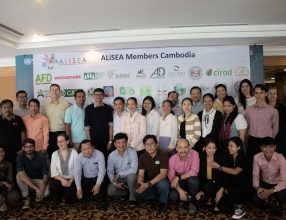
ALiSEA National General Assembly in Cambodia, 23 November 2022
Phnom Penh, 23rd November 2022, National General Assembly Workshop for ALiSEA Cambodia took place at the Sunway Hotel. The National General Assembly aims to present the key achievements of the network in 2022, to consult members on internal structuration and to set up the main action plan of the network in 2023. The event brought together 40 participants of the ALiSEA network, working in the field of agroecology across the country, such as local and international nongovernmental organizations, farmers organizations, networks, academic and government institutions. The workshop was co-organized by GRET, Development and Partnership in Action (DPA), Cambodian Farmer Federation Association of Agricultural Producers (CFAP), DanChurchAid (DCA), ECOLAND Cambodia, and ActionAid Cambodia, as part of the ASSET project funded by the French Agency for Development (AFD), the European Union (EU), and the French Facility for Global Environment (FFEM). The General Assembly is ALiSEA’s annual event through which it’s members can review the progress of the network and provide their feedback to ensure that the network is working in the right direction that would benefit each member. The national General Assembly is a crucial moment to gather all members in-person, to discuss strategy and priorities issues, to learn from each other and exchanges […]
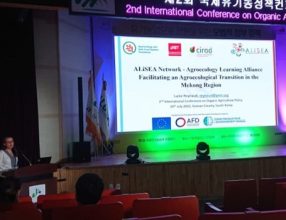
Best Policies towards Transformation into Organic Agriculture, July 2022 in South Korea
From 18-21 July 2022, the 8th ALGOA & 3rd GAOD Summit (Global Alliance of Organic Districts) and the 2nd International Conference on Organic Agriculture Policy was held in South Korea, organized by IFOAM – Organics International and Goesan County. What is IFOAM? The IFOAM – Organics International – is a membership-based organization working to bring sustainability to agriculture across the globe. Initiated in 1972 they gathered members from more than 100 countries, Organized in regional bodies, IFOAM –Organics international established IFOAM Asia in 2012. Based in South Korea, IFOAM Asia gathers more than 270 members from 22 Asian countries. IFOAM Asia missions are: (i) improving the conditions of farmers, laborers, women, indigenous and other marginalized groups, (ii) restoring nature’s balance and capability and (iii) contributing towards building sustainable societies To know more on IFOAM – Organics International To know more on IFOAM – ASIA ALGOA or the “Asian Local Governments for Organic Agriculture” is an ambitious program initiated by IFOAM Asia and Goesan County engaging local governments to promote the development of organic agriculture and its related industries in Asia. ALGOA intends to stimulate the dialogue between the private and the public sectors and to establish a good working relationship […]
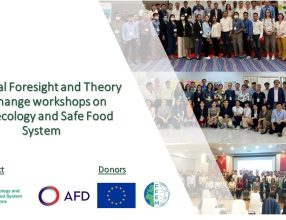
National Foresight and Theory of Change workshops on Agroecology and Safe Food System
From 12th to 19th October 2022, three national Foresight and Theory of Change workshops on Agroecology and Safe Food System have been organized as part of the ASSET project activities. The workshop aimed to: Engage key stakeholders involved in agroecology in Cambodia, Laos and Vietnam in a reflexion about: the future of the agricultural and food systems at the national level, the potential associated with agroecology in driving changes towards sustainability. Guide the interventions of the ASSET project and inform its Monitoring, Evaluation and Learning (MEL) strategy. The workshops took place over two days in each of the three countries: Cambodia, Laos and Vietnam, with more than 130 participants (In Cambodia 42 participants including 16 women, in Laos 59 participants including 25 women and in Vietnam 38 participants including 23 women) bringing together farmers representatives, local and international CSOs, researchers and academia, private sectors and government agencies. During the introduction session, the ASSET team presented the objectives of the workshop and shared the results of the consultation workshop on the concept and key principles of agroecology in order to remind the common values and understanding of the country. In addition, keynote presentations introduced the discussions of the workshop by (i) presenting […]
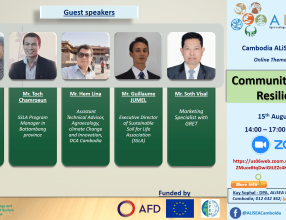
The result of Cambodia ALiSEA Network “Online Thematic Session to Share Experience on Community Market Resilience”
Objectives: To share knowledge and experience on strategies to support Agroecology products and market linkage To promote knowledge and experiences exchange and foster learning among ALiSEA members. 4th ALiSEA Network thematic session in Cambodia has been held on 15 August 2022, with the topic on “To sharing Experience on Community Market Resilience”. There were about 37 participants from research center, NGOs, International NGOs, University lecturers, young farmers…. participating in the event. With the 5 speakers to share their experiences as: Presenter 1: Mr. Prum Samat, CFAP Chairman, and Chairman of Torng Thlork Agricultural Cooperative. Topic: “Mushroom Production for the Community Market” Presentation: Introduction of Torng Thlork AC Technical description of mushroom production Market of mushroom (for Detail, please refer to attachment) Presenter 2: Mr. Toch Chamoeun, SSLA Program Manager in Battambang Province. Topic:” Challenges of agroecology transition in Community Market Resilience.” Presentation: PGS efforts and progresses in the Cambodia Promoting factors for PGS Presenter 3: Mr. Hem Lina/Ms. Celia, Assistant Technical Advisor, Agroecology, Climate Change and Innovation, DCA Cambodia. Presentation of Learning from the farmer-to-farmer and NGO knowledge sharing on agroecological markets and food sovereignty Presenter 4: Mr. Jumel Guillaume, SSLA. Topic: “Marketing Techniques and Community Market Resilience” Presentation: Understanding community […]
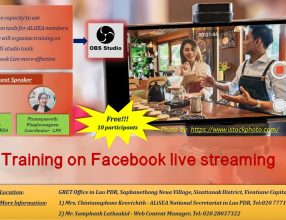
The result of Training on Facebook live streaming
Background To improve the capacity to use communication tools for ALiSEA members. Therefore, we organized training on how to use OBS studio tools to help Facebook Live more effectively. ALiSEA network in Laos has been held on the Training on Facebook live streaming on 17th August 2022, at GRET Office in Lao PDR. There are 12 participants from 9 organizations that are members of the ALiSEA network in Laos Speaker Phonepaseuth PHAPHOUNGEUN, she is coordinator of Lao Farmer Network (LFN), who has experience in being an organizer, manager and running Facebook live programs of the LFN such as: https://fb.watch/eZqmoyqWJu/ Soumet PHONEPASEUTH, He is a communication officer in the InYouth Production unit of the Rural Development Agency (RDA) with experience in manager Facebook live programs of the RDA such as: https://www.facebook.com/RDALAOS/videos/1205415310288104 All the participants know how to live stream through Facebook by going to watch live stream, organizing various events, streaming games online… There are some participants who have experience in live streaming through Facebook, but none of them use OBS studio program to live stream. Results from this training Participants learned a lot about Facebook live streaming via Zoom, live streaming through the Facebook Live app, or using OBS Studio […]
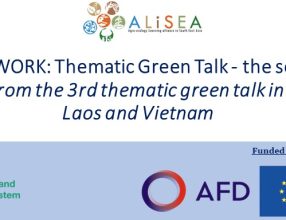
ALiSEA NETWORK Thematic Green Talk – the series EP.03: The results from the 3rd thematic green talk in Cambodia, Laos and Vietnam
Objectives: To strengthen knowledge and experience sharing on agroecology according to topics of interest raised by ALiSEA members; To encourage informal exchanges and foster learning among ALiSEA members; and To increase the visibility of agroecological initiatives. ALiSEA network has been held on the ALiSEA Network – thematic green talk – the series in Cambodia, Laos and Vietnam. The 3rd thematic meeting in Cambodia 3rd ALiSEA Network thematic session in Cambodia has been held on 17 March 2022, with the topic on “Share Experience on Challenges of Flood plains ‘irrigated perimeter“. There were about 32 participants from research center, NGOs, International NGOs, University lecturers, young farmers…. participating in the event. With the 3 speakers to share their experiences as: Mr. Phoeurk Raksmey: Project Manager of Center of Excellence on Agricultural Economic and Rural Development, presented on a topic of “Water management in Takeo province” Mrs Prémila Masse: Program manager Sustainable Food and agriculture system, presented on a topic of “Agroecology transition limits in Battambang province“ Mr. MIN Sophoan: Country Coordinator, AVSF Cambodia, presented on a topic of “Steung Chinit irrigation Scheme in Kampong Thom province” Here is the video recorded: The 3rd thematic meeting in Laos 3rd ALiSEA Network thematic session […]
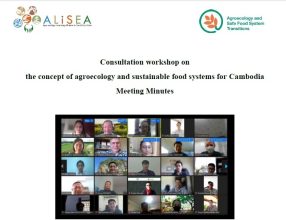
Agroecology Key Principles Consultation Workshop in Cambodia – 24th March, 2022
On 24th March, 2022, ALiSEA Team in Cambodia and the ASSET Team Project co-organized an online workshop to discuss, review and reach common understanding of the Agroecology and Food System Principles, concrete field experiences and constraints in the context of Cambodia. This consultation workshop is part of the participatory process to build a common vision and understanding of the agricultural and food system and the changes needed to achieve agroecological and sustainable food systems transitions at national level. The consultation was organized into five sessions: Introduction to set the scene Identification of key words for Agroecology & Safe Food System Formulation of principles and practices Present the existing frame of AE concepts Wrap up and next steps In total, 32 participants joined the online workshop (ALiSEA Members and key stakeholders engaged in Agroecology). Klaxoon app was used to support the online discussions via zoom video conference. All the results of discussions are available on the Klaxoon here: https://app.klaxoon.com/animate/board/NGWPUWY All presentations can be downloaded here Introduction to set the scene – Ms Lucie Reynaud (GRET/ ALiSEA Regional Coordinator) Presentation on agriculture context and problems identified in Cambodia – Ms. Somaly Oum (Ecoland/ALiSEA Knowledge Management) Presentation on the 10 Agroecological Elements of FAO and […]
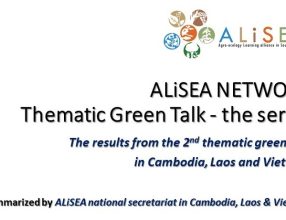
ALiSEA NETWORK Thematic Green Talk – the series EP.02: The results from the 2nd thematic green talk in Cambodia, Laos and Vietnam
Objectives: To strengthen knowledge and experience sharing on agroecology according to topics of interest raised by ALiSEA members; To encourage informal exchanges and foster learning among ALiSEA members; and To increase the visibility of agroecological initiatives. ALiSEA network has been held on the ALiSEA Network – thematic green talk – the series in Cambodia, Laos and Vietnam. The 2nd thematic meeting in Cambodia 2nd ALiSEA Network thematic session in Cambodia has been held on 18 February 2022, with the topic on “chicken production and value chain”. There were about 37 participants from research center, NGOs, International NGOs, University lecturers, young farmers…. participating in the event. With the 3 speakers to shared their experiences as: Mr. Hy Sothy, Tropaing Sror Nge Agricultural Cooperative in Tramkak of Takeo province, presented on a topic of “Collective Business as Chicken Food Production and Value Chain” Mr. Chhong Sopha, program leader of Farmer and Nature Net Association, had a speech on the topic of “Value chain of chicken production in Kandal, Kampong Thom, Takeo, and Svay Rieng province” Dr. Nhem Sareth, Country Director of Heifer International Organization had presented on a topic of “Chicken Value Chain” Note of the meeting is available to download here: […]
ALiSEA Internal Policy Dialogue Working Group in Vietnam – 1st Meeting
Date: Monday 1st November, 2021 Venue: Hanoi, Vietnam Role of the Working Group: to define the strategy, key prioritize and action plan of the ALiSEA Network Objectives Objectives of the working group meeting: Reviews of ALiSEA networks & operations so far. Take stock of members and non-members experiences Present the results of the online questionnaire on policy dialogue Initial thoughts on ALiSEA network on policy dialogue Co-develop ALiSEA Network Strategy and Action Plan related to Policy Dialogue Morning Session Aims to share current policy initiatives in favor of agroecology and food sustainable transitions and foster experience sharing among ALiSEA members Participants: ALiSEA members and non-members Reviews of ALiSEA networks & operations so far, Ms Lucie Reynaud – GRET/ ALiSEA Current policy initiatives for agroecology transition: Testimony from national government, Dr. Hoang Thanh Tung – VAAS Experience on policy dialogue from ALiSEA Member N1, Dr. Hung – NOMAFSI Experience on policy dialogue from ALiSEA Member N2, Mr Truong Quoc Can – CISDOMA Plenary Discussion, Patrick D’Aquino – CIRAD What are the successful and learning field initiatives that should be documented? Present the case-studies template Afternoon Session Aims to foster brainstorming and discussion with members about what are the needs, what is […]
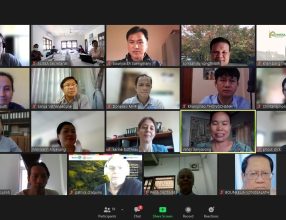
ALiSEA Internal Policy Dialogue Working Group in Lao PDR – 1st Meeting
Date: Thursday, 18th November, 2021 Venue: French Institute, Vientiane Capital Role of the Working Group: to define the strategy, key prioritize and action plan of the ALiSEA Network Objectives Objectives of the working group meeting: Reviews of ALiSEA networks & operations so far. Take stock of members and non-members experiences Present the results of the online questionnaire on policy dialogue Initial thoughts on ALiSEA network on policy dialogue Co-develop ALiSEA Network Strategy and Action Plan related to Policy Dialogue Morning Session Aims to share current policy initiatives in favor of agroecology and food sustainable transitions and foster experience sharing among ALiSEA members Participants: ALiSEA members and non-members Reviews of ALiSEA networks & operations so far, Ms Lucie Reynaud – GRET/ ALiSEA Current policy initiatives for agroecology transition: Testimony from national government, Mr. Somsamai Vongthilard – DOPLA Experience on policy dialogue from ALiSEA Member N1, Mr. Thongdam Phongphichith – SAEDA Experience on policy dialogue from ALiSEA Member N2, Mr. Phoutthasinh Phimmachanh – LFN Experience on policy dialogue from ALiSEA Member N3, Ms Vansy Senyavong – MHP Experience on policy dialogue from ALiSEA Member N4, Mr. Bounyasith Sengmany – GRET / BNDA Plenary Discussion, Patrick D’Aquino – CIRAD What are the successful […]
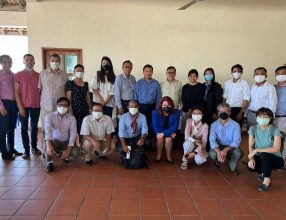
ALiSEA Internal Policy Dialogue Working Group in Cambodia – 1st Meeting
Date: Friday, 10th December, 2021 Venue: Phnom Penh Role of the Working Group: to define the strategy, key prioritize and action plan of the ALiSEA Network Objectives Objectives of the working group meeting: Reviews of ALiSEA networks & operations so far. Take stock of members and non-members experiences Present the results of the online questionnaire on policy dialogue Initial thoughts on ALiSEA network on policy dialogue Co-develop ALiSEA Network Strategy and Action Plan related to Policy Dialogue Morning Session Aims to share current policy initiatives in favor of agroecology and food sustainable transitions and foster experience sharing among ALiSEA members Participants: ALiSEA members and non-members Reviews of ALiSEA networks & operations so far (video message), Ms Lucie Reynaud – GRET/ ALiSEA Current policy initiatives for agroecology transition: Testimony from national government, Dr. Seng Vang – GDA Experience on policy dialogue from ALiSEA Member N1, Mr Mam Sambath – DPA Experience on policy dialogue from ALiSEA Member N2, Mr Sok Sotha – CFAP Experience on policy dialogue from ALiSEA Member N3, Ms.Kristen Rasmussen and Ms. Celia del Campo Aragones – DCA Afternoon Session Aims to foster brainstorming and discussion with members about what are the needs, what is satisfactory, define priorities […]
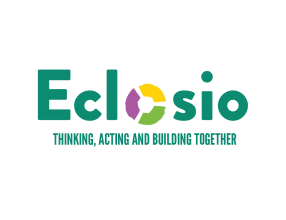
Expert/Evaluation Team to Perform Final Evaluation Program 2017-2021 – Eclosio Cambodia
Announcement Description In 2016, four Belgian University NGOs (ECLOSIO, FUCID, Louvain Coopération, and ULB Coopération) have decided to join forces and strengthen their synergies through the creation of the entity “Uni4Coop” and the mutual engagement in the implementation of one common program funded by the Belgian Development Cooperation (DGD). In Cambodia, the Uni4Coop Program is implemented by, ECLOSIO and Louvain Coopération (LC), and has 3 Specific Objectives (SO) tackling two sectors, Agriculture/Rural Economy and Health. ECLOSIO and LC are both involved in the agriculture and economic sector (SO1 and SO2), LC alone is involved in the health sector (SO3). Within the framework of the 2017-2021 Uni4Coop program, two evaluations are planned: a Mid-Term Review (MTR) conducted in 2019 and a Final Evaluation to be conducted in 2021. This ToR aims to specify the scope of the Final Evaluation to be performed in Cambodia for the Agriculture and Economic sector. Bid Components Expert/Evaluation Team to Perform Final Evaluation Program 2017-2021 Call for Proposals Location: Phnom Penh Objectives of the final evaluation are as follows: The overall purpose of the final evaluation is to assess the relevance, coherence, efficiency, effectiveness, sustainability and recommend specific measures for further improvement in relation to the design, implementation, or the M&E of the programme. The final evaluation shall demonstrate accountability for results and inform broader programme assessments. Conclusions retrieved from this Final Evaluation will be used for the improvement of the planned strategies of the new program. Global approach This is an external evaluation. The theme on which this Final Evaluation focuses was retrieved from common interest elements between LC and Eclosio in Cambodia. The Scope of Work (SOW) detailed in the ToR will be reviewed by the evaluation team and the evaluation steering committee together with the selected evaluator in order to achieve the desired results and objectives at a feasible and measurable level. Time schedule The completion of this work is expected to take approximately from Mid-December 2021 to February 2022 following signing the contract. The submission of the final report is expected to be submitted on March 31st 2022 and the final version published in June 2022. However, the timetable stated in point A.7.1. of the ToR is indicative only, leaving to the evaluator team to propose a timetable that will fit to their availability; this should be also specified in the proposal. Budget The maximum budget available is 12,000.00 EUR including tax. Bidder Eligibility Proposals must provide the following: An understanding note […]
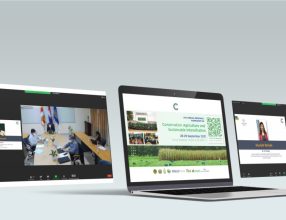
2nd CASIC Regional Training on Conservation Agriculture & Sustainable Intensification and Agroecology
Phnom Penh, 28-29 September 2021: Cambodia Conservation Agriculture and Sustainable Intensification Consortium (CASIC) held its 2nd Annual Regional Workshop with the focus on development of and transition towards Conservation Agriculture & Sustainable Agriculture (CA/SI) and Agroecology (AE) in the region. The virtual workshop was attended about 150 participants from 28 countries. Over 20 national and international speakers and facilitators, all experts in their field, presented on the CA/SI status in Asia, the challenges with regards to broad scale adoption of CA/SI, methodologies on managing diversity in CA/SI systems, driving CA/SI dissemination process and last but not the least on support by development partners on enabling CA/SI environment. This workshop was organized following the success of the Regional Training on Appropriate Scale Mechanization for Conservation Agriculture, which was held in 2019 in Siem Reap and Kampong Cham provinces of Cambodia. Session 1: Updating CA/SI status in Asia (Cambodia, China and India) – Download Session 1 Presentation Remarkable progress and clear future directions include scaling model, appropriate implements, training materials, and institutional and policies We have spent decades, great deals of efforts and resources in reaching toward CA/SI Large-scale adoption of CA remains challenging. Thus, more efforts, time, resources, etc. are required to […]
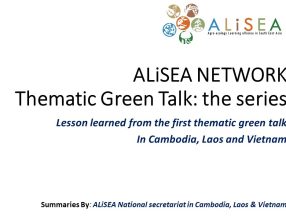
ALiSEA NETWORK Thematic Green Talk – the series EP.01: The results from the first thematic green talk in Cambodia, Laos and Vietnam
Objectives: To strengthen knowledge and experience sharing on agroecology according to topics of interest raised by ALiSEA members; To encourage informal exchanges and foster learning among ALiSEA members; and To increase the visibility of agroecological initiatives. ALiSEA network has been held on the ALiSEA Network – thematic green talk – the series in Cambodia, Laos and Vietnam. The first thematic meeting in Cambodia Date: August 26, 2021 Number of participants: 70 people (Farmer organizations, universities, freelance, government bodies, NGOs and Private sectors) Time: 10h00 -12h00 Topic for meeting: Share Experience on Participatory Guarantee System (PGS). The main interested topics Chicken Food Improvement and Value Chain Soil Fertility Management Youth Engagement in Agroecology Transaction The presentations & documents are available to download here: Notes for Thematic Green Talk #1_ Final The first thematic meeting in Laos Date: August 6, 2021 Number of participants: 44 people included 21 women (Farmer organizations, universities, freelance, government bodies, NGOs and Private sectors) Time: 9h00 -11h15 Topic for meeting: Market access of Laos’s agricultural products. The main interested topics The issue on applying the Contract farming between buyer and producer. The market information data sharing should be transparence from the relevance stakeholders (Quota, standard, method […]
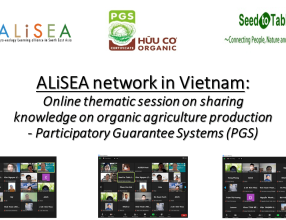
ALiSEA network in Vietnam: Online thematic green talk on sharing knowledge on organic agriculture production – Participatory Guarantee Systems (PGS)
On 24th September, ALiSEA, PGS Vietnam and Seed to table have been organized the online thematic session on sharing knowledge on organic agriculture production – Participatory Guarantee Systems (PGS). There were about 50 participants from research center, NGOs, International NGOs, University lecturers, young farmers…. participating in the event. The purpose of this event was to: Strengthen knowledge and experience sharing on Agroecology according to topics of interest raised by ALiSEA members Encourage informal exchanges and foster learning among ALiSEA members Increase the visibility of agroecological initiatives In this event, 3 speakers were invited from: Ms. Tu Tuyet Nhung, the president of PGS Vietnam, one of the people who laid the foundation for the development of the PGS (Participatory Guarantee System) in Vietnam. Ms. Mayu Ino, the Director of Seed to Table, a Japanese NGO. Ms. Hoang Thi Nga, the leader of Phu Ngoc Group of Luong Son Organic Inter Group. The presentation is available to download: Online thematic session to share experience on PGS Development of PGS and environmental education for children in Ben Tre and Dong Thap Provinces PGS Vietnam -management and certification ——————————————- The ALiSEA thematic green talk are often held in Cambodia, Laos and Vietnam. It brings […]
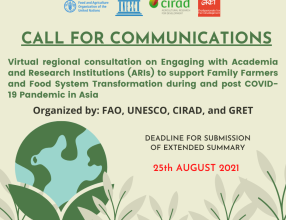
Call for communications for a virtual regional consultation on Engaging with Academia and Research Institutions (ARIs) to support Family Farmers and Food System Transformation during and post COVID-19 Pandemic in Asia
Background The food systems in the region have undergone important changes over the past decades, mostly due to rapid economic growth, increasing population and demographic shifts, rapid urbanization, rural and urban transformation, changing food consumption behavior and climate change (FAO, 2018). The effects of the COVID-19 pandemic on agriculture have been exacerbated by the way in which the current industrial farming system is set up (Altieri and Nicholls 2020), and have impacted in particular family farmers (World Bank 2020; OXFAM 2020), who represent the majority of farmers in the region1. Agroecology as a holistic approach can contribute in addressing these challenges and can go a long way in transforming food and agriculture systems to build an inclusive, safe, sustainable and resilient society. There are over 6000 Higher Education Institutions (HEIs) in ASEAN region alone (ASEAN Secretariat, 2014). They can provide a powerful opportunity in building a new generation of farmers, extensionists and policy makers to address the challenges faced by agrifood systems in Asia. However, no study has adequately documented or assessed how Agroecology (including sustainable and climate resilient agriculture, community sustainability issues) is prioritized, supported, studied or applied among HEIs, and more broadly, among Academia and Research Institutions (ARIs), […]
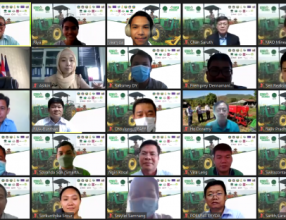
Consultation Meeting on MetKasekor Agriculture Extension Model
Phnom Penh, 05 August 2021: Information Technologies and Innovation for Agriculture: Consultation Meeting on MetKasekor Model, was remotely organized as a part of the United Nation’s Member State Dialogues under the Food Systems Summit 2021 Dialogues Gateway This consultative meeting sensitized the different departments of the Ministry of Agriculture, Forestry and Fisheries (MAFF), the Provincial Departments of Agriculture, Forestry and Fisheries (PDAFFs), the private sector and other relevant stakeholders and to discuss the opportunities for transformation of agricultural extension services as part of a new era for digitalization. Over 35 people, representing different key technical and provincial departments of MAFF, private companies, and development partners were in attendance of the event. EVENT: Food Systems Summit 2021 Dialoges Gateway H.E. Dr. Chan Saruth, Undersecretary of State, MAFF Dr. Seng Vang, Director of Department of Agriculture Land Resources Management Full article about the event HERE Downloads Information Pack_MetKasekor Consultative Meeting_KH Information Pack_Metkasekor Consultative Meeting_ENG MetKasekor Consultative Meeting Slide Presentation_KH Opening Remark of H.E. Dr. Chan Saruth_KH ———————————————- About MetKasekor MetKasekor is an innovative extension model. MetKasekor focuses on opening the market for private sector investments. The model is a government resource for the future with the intention to improve the public agricultural extension service system in Cambodia. MetKasekor is a result of […]
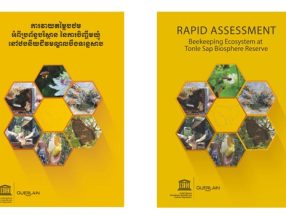
Rapid Assessment Report to promote Sustainable Beekeeping in Cambodia
On 15th July 2021, UNESCO, in cooperation with the Civil Society Alliance Forum (CSAF) of the Office of Council of Ministers, in partnership with the Asian Cultural Council and the Asian Vision Institute, and the European Union, organized the virtual launch of the UNESCO Rapid Assessment: Beekeeping Ecosystem at Tonle Sap Biosphere Reserve. The first-of-its-kind initiative aims to promote sustainable beekeeping in Cambodia, for fostering biodiversity conservation, food security, eco-tourism development, and livelihoods development for local communities. The Launch was presided by H.E. Yim Chhaily, Deputy Prime Minister and Chair of Chairman, Inter-Ministerial Committee for Coordinating the Implementation of “100 TECHO Villages” (ICCI.100). The event was addressed by H.E. Thong Khon, Minister of Tourism; H.E. Suos Yara, Director General, Asian Cultural Council; H.E. Chuop Paris, Director General of General Directorate of Environmental Knowledge and Information, Ministry of Environment; H.E. Carmen Moreno, EU Ambassador to Cambodia, and Mr. Sardar Umar Alam, UNESCO Representative to Cambodia. Ms. Angelina Jolie, Godmother of the UNESCO-Guerlain Women for Bees Programme delivered a message for the launch of the report. More than 150 participants joined the virtual launch event of the Report, which has been produced in both the Khmer and English languages. Attendees included wide-ranging representatives from line ministries, embassies, development partners, associations, […]
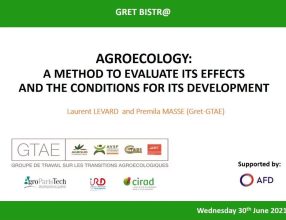
A methodological Handbook for the Evaluation of Agroecology: from theory to practice.
On Wednesday 30th June, GRET organized an online webinar on the occasion of the translation of the handbook for the evaluation of the agroecology in English. In total, 80 people participated in this session. Participants were ALiSEA Network Members, ASSET project partners, Members of the two Research for Development Partnership Platform : ASEA (https://www.asea-network.org/) and MALICA (https://www.malica.org/) As a tool to promote and support the development of agroecology, the handbook (https://www.gret.org/publication/handbook-for-the-evaluation-of-agroecology/?lang=en) provides to development stakeholders methodological benchmarks to evaluate agroecology: about conditions of its development, results and effects of its practices and interventions. It proposes various socio-economical and agro-environnemental evaluation criteria, together with indicators and methods. As a first methodological document, it may evolve and be adjusted along its usages into ongoing projects. The handbook conception came from a collaboration between various partners: the Working group on agroecological transitions/GTAE that includes: Agrisud International Agronomes et Vétérinaires Sans Frontières/AVSF CARI GRET The Comparative agriculture and agricultural development teaching and research unit at AgroParisTech; The Agroecology and Sustainable intensification of annual crops (AÏDA) research unit at Cirad, and The Functional ecology and biogeochemistry of soils and agro-systems (Eco&Sols) mixed research unit at IRD. The Handbook contents has been presented by Premila Masse and Laurent Levard, Gret’s program […]
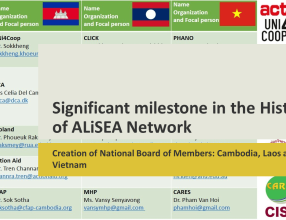
Significant milestone in the History of ALiSEA Network – Creation of National Board of Members: Cambodia, Laos and Vietnam
Vientiane, 31 May 2021. A significant milestone in the history of ALiSEA Network was reached towards an autonomous member-managed network with the creation of the National ALiSEA Board of Members in three countries: Cambodia, Laos and Vietnam! The National ALiSEA Board of Members (BoM) will play a key role in supporting the network structuration, shaping its governance, building a shared vision among members and developing national strategy and action plan. As a result of the call for interest launched early 2021, among all ALiSEA Network Members, the Board of Members is now put in place and consist of five members organizations in Cambodia, four in Laos and five in Vietnam. The selection committee was composed of eight people from GRET, CIRAD and the current ALiSEA national secretariat. The selection committee involved people at national and regional levels. List of the National ALiSEA Board of Members organizations and focal points: * One GRET Regional Small Grant Manager, based in Vientiane, will support the process at regional level. Get to know more the National ALiSEA Board of Member by clicking on the BoM’s presentations below: Cambodia, Wednesday 7th April = https://ali-sea.org/aliseaonlinelibrary/alisea-national-board-of-members-introduction-in-cambodia/ Laos, Monday 26th April = https://ali-sea.org/aliseaonlinelibrary/alisea-national-board-of-members-introduction-in-lao-pdr/ Vietnam, Friday 7th May = https://ali-sea.org/aliseaonlinelibrary/alisea-national-board-of-members-introduction-in-vietnam/ In total […]
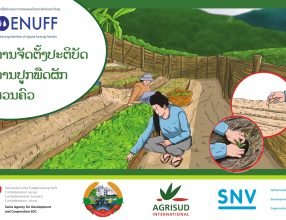
Master-Farmer booklets: a new series on vegetable gardening techniques
“Agrisud International and SNV, within the framework of the ENUFF project (Enhancing Nutrition for Upland Farming Families) financed by the SDC, have published a series of manuals intended for Master-Farmers, farmers selected and trained to disseminate agro-ecological techniques to their peers. After distributing the series of manuals dedicated to the production of fodder plants and the development of improved pastures, a new series on vegetable gardening techniques is proposed in this article. This series is made up of 4 manuals: Implementing a vegetable garden Making a solid compost Preparing biopesticides Vegetable crop association and bowl cultivation These manuals have been written and illustrated for Master-Farmers. They are not intended to be exhaustive or to be used by agricultural engineers or students of agricultural sciences. These manuals are the result of collections of farmers’ experiences concerning the techniques adopted or modified to adapt to their pedoclimatic and socio-economic context. They are written in a register of simple and non-formal language, so that they can be understood by all. For more information, please contact Ms. Claire Kieffer ([email protected]) or Mr. Khamphao Thongchanh ([email protected]).”
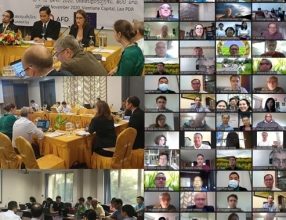
The official kick-off workshop on Agroecology and Safe food System Transitions in Southeast Asia
The official kick-off meeting of the regional project for the development of Agroecology and Safe food System Transitions in Southeast Asia (ASSET) took place on November 10-12 in Vientiane Capital, Lao PDR. Around 130 people attended this event online and 20 in person both in Lao PDR and in Vietnam. The objectives of the kick-off workshop was to introduce the ASSET project, with online plenary presentations and Q&A in the afternoon (Asian time), and discussions in working groups in the morning (Asian time). Due to the Covid situation, the working groups in Cambodia and Myanmar had to be rescheduled and will be held by December. In their welcoming remarks, Dr. Thatheva Saphanthong, Director of the Department of Agriculture Land Management (DALaM), stressed that ”ASSET regional project was built on the results of the ACTAE project that have been developed to embed agroecological research outputs into the regional context and that now need to be mainstreamed, broadened in scope by integrating food system concerns”. Mrs Julie Gabet-Ouahioune, from the French Development Agency (AFD), emphasized that “An enabling environment needs to be created, including the right policies, public investments, institutions and research priorities.” Representatives of Vietnamese, Lao PDR, Cambodian, Myanmar, European […]
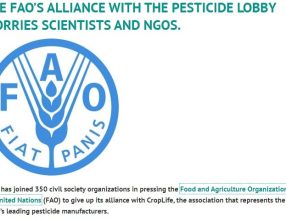
THE FAO’S ALLIANCE WITH THE PESTICIDE LOBBY WORRIES SCIENTISTS AND NGOS.
Last month the UN Food and Agriculture Organisation (FAO) signed a Letter of Intent “to explore new partnerships between the UN Agency and the private sector”. CropLife International (CLI), the pesticide industry association, interpreted the event slightly differently by claiming they had signed a strategic partnership agreement with the Food and Agriculture Organization of the United Nations (FAO). Whatever the details of the letter/agreement, it is clear that FAO and the pesticide industry have taken steps towards some kind of partnership… and a lot of people are concerned about this. Just last week, 350 organizations in 63 countries representing hundreds of thousands of farmers, fisherfolk, agricultural workers and other communities, as well as human rights, faith-based, environmental and economic justice institutions, delivered a letter to the FAO Director General urging him to halt the plans for a partnership with CropLife. Another letter has been signed by 250 international researchers and academics. FAO a regional programme that taught farmers how to manage crops according to agro-ecological principles, thereby reducing or eliminating the need for pesticides. Mark Davis, who was head of the the FAO Pesticide Management Programme from 2007 -2015 has also written to the Director General. This is part of what he had to say: “Having the FAO logo associated with […]
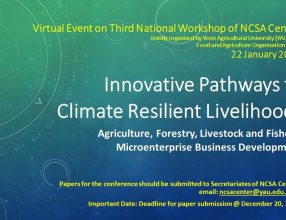
Call for Papers: 3rd National Workshop on “Innovative Pathways to Climate Resilient Livelihoods”
National Climate Smart Agriculture Center, (NCSA Center), Yezin Agricultural University and Food and Agriculture Organization of the United Nations (FAO) launch a call for papers. Please submit the research paper to the third national workshop of NCSA Center at the theme of “Innovative Pathways to Climate Resilient Livelihoods”, which will be virtually organized in 22 January, 2021. The 3rd National Workshop on “Innovative Pathways to Climate Resilient Livelihoods” aims to bring researchers, scholars, scientists, policymakers, environmental science community, academicians and weather scientists on one platform to showcase their research efforts and contributions. We invite you all participants to attend the virtual event on Innovative Pathways to Climate Resilient Livelihoods for a wonderful experience, knowledge sharing, networking opportunities, publishing and many more. Four sub-themes of the 3rd National Workshop on Innovative Pathways to Climate Resilient Livelihoods are Agriculture Forestry Livestock and Fishery Microenterprise Business Development When submission, only research papers which have a well-structured scientific article will be accepted. Format for paper submission are (Font: Time New Roman; Font size: 12; Line Spacing: 1.5; Page size: A4; Margin: Normal (Top 1 inches, Bottom 1 inches, Left 1 inches, Right 1 inches); No. of pages: 12-15 pages) Deadline for Submission: 20 December 2020 Following these guides, the soft /hard […]
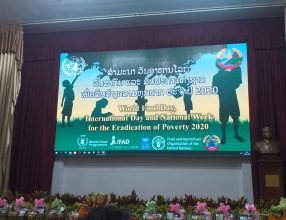
World Food Day celebration in Lao PDR
World Food Day celebration in Lao PDR was organized by the Ministry of agriculture and forestry, on the 30th of October 2020 at NAFRI. The meeting was attended by a total of 210 participants from the Department of the Ministry of Agriculture and Forestry, including researchers, professors, students from NUoL, and representatives from various international organizations such as representatives from the Food and Agriculture Organization (FAO), UN, ACA, CIA…The morning session is an official ceremony and the afternoon session is a Seminar for World Food Day 2020 – focusing on “Grow, Nourish, Sustain together. Our Actions are our Future”. The contents of the presentation and discussed at this meeting include: Session 1: Grow, Nourish, Sustain together Clean agriculture development for food security and nutrition in Lao PDR, Ms. Phonethip SOMMANY – DOA Gender Empowerment and Agricultural Production in Lao PDR, Dr. Keuangkham SISENGNAM – NUoL Mechanisms for rice seed production to ensure financial sustainability, quality, and quantity, Chanthakhone BOUALAPHANH – NAFRI Scaling-up Sustainable Land Management practices by smallholder farmers, Bounthanom BUAHOM – NAFRI Session 2: Policy and Actions for Nutrition and Recovery and Poverty Reduction International days for poverty reduction: Tacking the pandemic induced impoverishment in Lao rural areas, Mr. […]
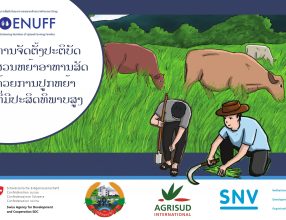
The Enhancing Nutrition of Upland Farming Families” (ENUFF)
The Enhancing Nutrition of Upland Farming Families” (ENUFF) project of the Swiss Agency for Development Cooperation (SDC) is implemented by SNV Netherlands Development Organization in partnership with Agrisud International in Oudomxay and Huaphan Provinces. Agrisud has developed a series of Master-Farmer booklets to support the dissemination of techniques from farmer to farmer in the framework of the ENUFF Project. The Master-Farmers are selected among the farmers who have regularly participated in the agricultural activities initiated by the project and have shown commitment and mastery of techniques in specific agriculture production over multiple years of adoption. They receive technical and pedagogical training from the project, in order to be able to transfer these practices to other families in their villages. To support them in their tasks, the ENUFF project has published various series of technical booklets specifically made for the Master-Farmers by Agrisud International. These Master-Farmer booklets were designed as a guidebook to remind them of the different steps of implementation of the technical training in the field, with practices. It does not have a vocation to be only read out loud or use in theoretical training. The technical contents have been simplified and modified based on the farmer field experiences […]
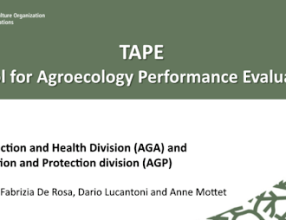
National workshop on the Application of the Tool for Agroecology Performance Evaluation (TAPE) in Lao PDR
Background As far as Laos is concerned, the GoL has prioritized “Clean Agriculture” in their national agenda for development, and set the vision for Agriculture Development Strategy 2016-2025 as “ensuring food security, producing comparative and competitive potential agricultural commodities, developing clean, safe and sustainable agriculture and shift gradually to the modernization of a resilient and productive agriculture economy, linking with rural development contributing to the national economic basis”. In line with Lao PDR’s commitment to the achievement of the Sustainable Development Goals (SDG), in 2018 of the Government of Lao PDR (GoL) adopted the Green Growth Policy and issued a directive to all Ministries to ensure that goals of the Green Growth Policy are incorporated in the implementation of the remainder of the 8th National Socio-Economic Development Plan (NSEDP) 2016-2020 and in the preparation of the 9th NSEDP 2021 – 2025. In Laos, there is an increased interest from various stakeholders to support farmers in transitioning towards and adopting more sustainable and agroecological practices. However, they face similar challenges in monitoring and demonstrating the impacts of such practices which hinder their capacities to advocate for broader support and promote their dissemination. Such an issue has been at the core of […]
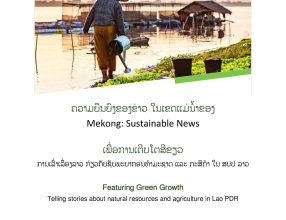
Mekong Sustainable News – A training program on storytelling about natural resources and agriculture in Laos
What is CFI? CFI is a French media cooperation agency mainly funded by the French Ministry of Foreign Affairs and International Development, and is responsible for coordinating and implementing public aid policy for promoting and enhancing the media in developing countries. CFI has currently involved in around thirty projects that fall within three major programmes: media and governance, media and enterprise, media, and development. CFI is implementing a project called “Mekong Sustainable News” to implemented activities related to media in order to support better understanding and coverage of environment-related issues, in the field of SDG’ achievement. The project is helping the coverage of scientific news in the following countries: Cambodia, Laos, Myanmar and Vietnam. What is Mekong News Project? Mekong News is a Project to support innovative digital journalism forms that will contribute to sustainable development in the Mekong region by focusing on: Training courses on the basics of online journalism, paving the way for impactful online journalism writing skills, especially news related to sustainable development. Tips and techniques to better engage the audience through online story writing. What has been done in Laos in 2019? Conducting 2 trainings for Working Journalist on Sustainable Development and Data Journalism 16 trainees […]
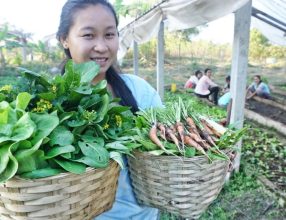
Youth engage for development in Laos
Today is International Youth Day 2020, August 12th, Theme: Youth Engagement for Global Action source Why work with youth? Do you know who/organization are working about Youth participation topics in Laos? The current population of Laos is 7,397,253 as of Sunday, August 09, 2020. 2,690,006 young people. We would like to introduce to you some of the projects that working for empowerment youth and engage them with development in Laos. Youth in natural resource management topic Project on ‘Dissemination of tools and methods on how to preserve land and natural resources’ is supported by Voice, Laos, Oxfam, and implemented by LIFE project and Stella. Click to see their project here: https://www.facebook.com/laolandinfo/videos/532521974312538/?v=532521974312538 They share their story (Lao version) click here: The river of Youth in agriculture “Panyanivej” –from the two Lao words “panya” (“wisdom”) and “nivej” (“ecology”) click: http://www.panyanivej.com/?v=6b40fe07a0e5 Lao Young Farmers Network Facebook here: https://www.facebook.com/LYFN2019 Young Farmer in Agriculture video: https://www.facebook.com/LYFN2019/videos/442514396479741/?v=442514396479741 Young agripreneurs for Green Rural Enterprise and Employment, implemented by SURAFCO, LURAS project. 3 provinces: Luangprabang, Xiengkhuang and Champasak Click to read their story here watch the video of Young agripreneurs each project: More stories from Phakhaolao website: https://www.phakhaolao.la/ youth’s products: Coffee Soap business How to start an organic vegetable business A young Lao community visit here: https://thestella.org/ Empowering volunteer in […]
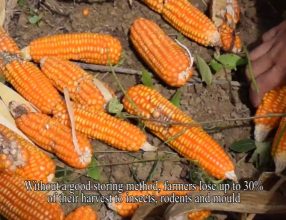
On-farm trial of drying and storage of maize for postharvest loss prevention” ACTION RESEARCH and VDO
by LURAS project, June 2020. Action research was conducted in Kham District, Xieng Khuang province to test new drying and storage practices and technologies. The objective of the trial was to provide farmers and the LURAS project with information on the potential benefits of adopting new drying and storing practices. The expected potential benefits include farmers being able to sell their maize when the prices are higher and/or farmers using their maize for other purposes such as preparing feed for animals. Action Research and Farmer-to-Farmer learning (F2F) are essential elements of the Green Extension approach being promoted by LURAS. This approach recognizes that sustainable agricultural practices must be adapted to local conditions and that these conditions are both diverse and dynamic in the uplands of Lao PDR. Therefore, Green Extension supports groups of producers in analysing local problems and opportunities, testing alternative practices, and sharing the knowledge they acquire with other farmers. In close cooperation with farmers, the research team introduced new ways of threshing and drying maize, and introduced new or improved storage practices at selected farmers’ households, including metallic hermetic silos, and small and large hermetic bags. Local welders were closely involved in the construction of metallic hermetic […]
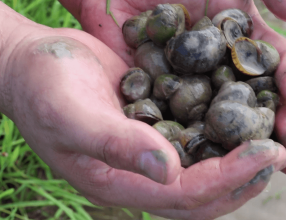
The new video collection of farmers’s voices and techniques produced by Lao Farmer Network
Why farmers in Laos are shifting from cabbage to cassava production When the COVID-19 pandemic hit globally, farmers in Laos are among the most affected. Many farmers could not sell their cabbages due to lack of buyers. The prices for cabbages also dropped, thus, some farmers in the country decided to shift to cassava growing. The advantages of growing cassava include: The price for cassava is stable, despite being lower compared to the market price for cabbage Cabbages are prone to rotting if not harvested at the right time. Meanwhile, cassava harvesting can be delayed and it will not incur problems. Cabbages can be easily damaged when being transported. This is not the same as cassava since it is not soft. There are limited numbers of buyers of cabbage at the farm gate. There are more buyers for cassava in the nearby areas. How to lure snails out of the rice field Members of the Lao Farmer Network (LFN) share an easy and organic way of luring snails out of the rice field. By using food scraps and other plants, you can quickly lure out snails that destroy rice plants. How to lure snails out of the rice […]
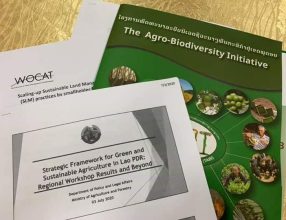
Green and Sustainable Agriculture Policy Framework Discussions, 3 June 2020, Lao PDR
original source: laofab.org June 3rd, 2020 SSWG on Agrobiodiversity update participants on the Lao PDR “Green and Sustainable Agriculture Policy Framework Discussions. The main activity of the SSWG will be to build on the Green and Sustainable Agriculture Framework by means of analyzing and documenting the success factors for the commercialization efforts by the private sector for three ABD-based products, specifically: Houaphanh shaded coffee, wild tea, and river weed. The intent is that this documentation will assist in leveraging the commercialization of additional unique, Lao ABD-based products, Lao clean agriculture products support green, and sustainable agriculture policy. Moreover there update on WOCAT sustainable land management technologies and practices was presented. The day will end with an update on the rapidly expanding PhaKhaLao Agrobiodiversity website database, activities and future directions. Chairs and Co-Chairs by FAO and NAFRI The photos of SSWG on ABD meeting as below: National Sustainable Land Management knowledge management database, visit the website click here For the presentations are available to download below: Strategic Framework for Green and Sustainable Agriculture in Lao PDR: Regional Workshop Results and Beyond Potential Climate-Smart Futures for agricultural production and commercialization Scaling-up Sustainable Land Management (SLM) practices by smallholder farmers Lao: ການຂະຫຍາຍເຕັກນີກການຈັດການຄຸ້ມຄອງທີີ່ດິນແບບຍືນຍົງ ໂດຍຊາວກະສິກອນຂະໜາດນ້ອຍ Clean agriculture production […]
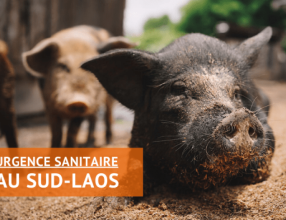
African Swine Fever (ASF): the other pandemic, situation and impact in Lao PDR
“African swine fever” (ASF) is an extremely resilient virus that has spread at an accelerated path in the region since 2019: originating from China, it hit Vietnam hard since the beginning of last year before spreading to Cambodia and Laos, Burma, the Philippines, Indonesia, Timor Leste and Papua New-Guinea (see FAO cartography and OIE bulletins). The crisis is settling worryingly in the region, and probably for a long time in the absence of a vaccine, given the resistance and contagiousness of the virus (which remains active for 6 months in carcasses even buried, or processed food, and is transmitted by footwear, tires, etc. where the virus can remain for several weeks or even months if not disinfected appropriately), and knowing that it can also be transmitted by wild fauna (wild boars and wild pigs) and that borders in the region are porous and difficult to control. The impacts for family producers are worrying: – Risk of food and nutritional crisis: pork is the second source of protein after fish in Lao PDR, already strongly affected by malnutrition in rural areas; – Risk of economic and social crisis: pork is an important security capital for rural families, providing them with quick cash for the […]
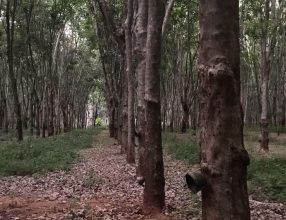
About chemical pesticide ban troubles farmers, industries
Cr: LaoFAB Update on Chemical pesticide issue in Thailand, Asia and abroad as below: Thailand’s chemical pesticide ban troubles farmers, industries BANGKOK (Reuters), JUNE 1, 2020- Thailand enforced a ban on Monday on two agricultural chemicals widely regarded as toxic to humans, prompting claims from farmers they will face losses, while environmental campaigners welcomed a step towards sustainability. Read more here: https://www.reuters.com/article/us-thailand-chemicals/thailands-chemical-pesticide-ban-troubles-farmers-industries-idUSKBN2382IC Chemical ban now in effect, farmers say they have few alternatives thethaiger, 03-06-2020 Farmers are given 90 days to return unused chemicals back to sellers. Farmers caught storing or using the chemicals after June 1 face charges of malfeasance. Those who sell, produce, import or export the chemicals can also face up to 10 years in jail and an up to 1 million baht fine. Full article here: https://thethaiger.com/hot-news/environment/chemical-ban-now-in-effect-farmers-say-they-have-few-alternatives … Court overturns EPA approval of popular herbicide made by Monsanto theguardian, Jun 4, 2020. The Environmental Protection Agency (EPA) broke the law in approving agricultural weedkilling products sold by Bayer and two other chemical giants, ignoring clear evidence that the new herbicides would cause widespread damage to crops, a federal court ruled on Wednesday. The decision by the US court of appeals for the ninth circuit invalidates the registrations for dicamba-based herbicides made by Monsanto, […]
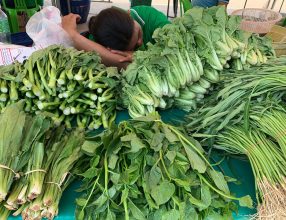
Support local farmers markets, support farmers for food security
Cr: LaoFAB moderator Around 30 percent of Vientiane clean agriculture production has been impacted adversely by the COVID-19 outbreak as well as hotter weather conditions, an official in the sector said. Head of Vientiane Organic Agriculture Production Group, Mr. Khamphou Phanthaboun told the media recently the group has 288 families producing for markets, and 30 percent of their production has been affected by the more difficult growing and selling conditions. The local organic markets usually sold an average of eight to nine tonnes of produce every Saturday, but the coronavirus pandemic meant that fewer customers were attending, he said. source: VT Times Food security concerns mount as COVID-19, as well as hotter weather and Thunderstorm conditions disruption leaves Laos farmers unable to plant. We have a chance to visited the organic market Last Saturday, they usually open on Wednesday and Saturday at the ITECC but there are also many places in Vientiane and in other provincial. Many fresh and processed products are waiting for you to buy, if you have an opportunity please support local farmers’ markets, support farmers for food security. Some photos from the organic market in Vientiane, at LaoITECC. LaoFAB Facebook. There are many local farmers markets around […]
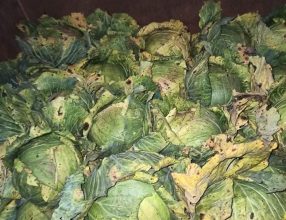
Impact of COVID-19 on small holder farmers & traders in Lao PDR
STATEMENT Support Family Farmers as Frontliners in the Fight to Eradicate COVID-19 We are leaders and members of the Asian Farmers’ Association for Sustainable Rural Development, with 20 member organizations and cooperatives in 16 countries in Asia, comprising around 13 million small scale women and men family farmers, fishers, forest dwellers, indigenous peoples, pastoralists, and herders. As a regional family farmers’ organization, we work with partner Farmers’ Organizations in 11 more countries in the Asia-Pacific through projects like MTCP2-AFOSP supported by the International Fund For Agricultural Development (IFAD), European Union (EU), and Swiss Agency for Development and Cooperation (SDC) as well as through projects with Global Agriculture and Food Security Program (GAFSP), International Land Coalition (ILC), Food and Agriculture Organization of the United Nations (FAO), Forest and Farm Facility (FFF), and World Rural Forum (WRF), reaching 30 million more family farmers. We likewise engage inter-governmental bodies such as the ASEAN in Southeast Asia and the SAARC Agriculture Center in South Asia. As of March 30, 2020, all our 27 covered countries have not been spared from the spread of COVID-19. All have confirmed positive cases with the majority reporting deaths caused by COVID-19. Some countries have experienced partial or total […]
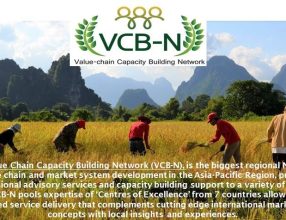
Proceedings of VCB-N Webinar 1: “The impact of the Covid-19 pandemic on agricultural value chains – What we can do to mitigate the impact!”
This webinar is hosted by VCBN for anyone who is interested in learning more about what we can do to support agricultural value chains and how to mitigate the impact of the Covid-19 pandemic and listen to potentially policy considerations from four representatives, who shared their different Covid-19 perspectives. The 2nd Webinar on 5th of May 2020. If you were not in the position to watch the Livestream; -> here is the LINK to the recording of the webinar -> here is the LINK to the summary report of the webinar moderator and speakers for of VCB-N Webinar 1 Biographies of the speakers can be found HERE: The partners who provided the films: The funders of the Value chain Capacity Building – Network (www.vcbnetwork.org): The next VCBN webinar will take place on: the first week of May 2020 – stay tuned “VCB-N Webinar 2 – “The impact of the Covid-19 pandemic on agricultural value chains – What we can do to mitigate the impact!” from a finance and corporate perspective
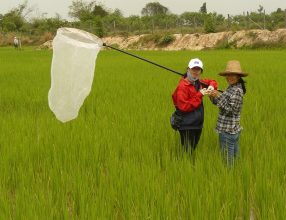
Making a Case for Safer Ways to Fight Rice Pests in the Greater Mekong
By Dirk Babendreier Rice is big business in the Greater Mekong Subregion (GMS) in Southeast Asia—not only as a vital source of food but also as a crop that provides work and income for 80 percent of the population. However, despite positive developments in the last decade, millions of tons are still being lost to pests, diseases, and weeds. In a new paper titled “Biological Control of Lepidopteran Pests in Rice: A Multi-Nation Case Study From Asia,” published this week in the Journal of Integrated Pest Management, fellow researchers from China, Laos, Myanmar, Malaysia, and Sri Lanka join me in reporting on the impact of stem borers in rice producing countries, where they regularly cause yield losses of about 20 percent. Indeed, in some parts of the Philippines and Indonesia, white stem borer can cause tremendous losses to productivity and alternatives to insecticide use are urgently required. While farmers have been fighting back with pesticides, this is not sustainable in the long run and instead my colleagues and I advocate the use of more environmentally friendly solutions. Working with partners, including the MARA-CABI Joint Laboratory for Bio-safety and the Chinese Academy of Agricultural Sciences, we are making a case that integrated […]
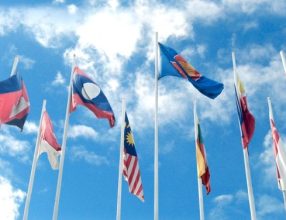
Statement of ASEAN Ministers on Agriculture and Forestry in Response to The Outbreak of The Coronavirus Disease (Covid-19) to Ensure Food Security, Food Safety and Nutrition in ASEAN
Statement of the ASEAN ministers on agriculture and forestry in response to outbreak of coronavirus disease (COVID-19) to ensure food security, food safety and nutrition in ASEAN We, the ASEAN Ministers on Agriculture and Forestry (AMAF) express our deep concern over the outbreak of the Coronavirus Disease 2019 (COVID-19), which has affected the lives of people and economies, including food, agriculture and forestry sectors in ASEAN and globally. We emphasize the importance of the food, agriculture and forestry sector, and urge to ensure that essential, safe and nutritious produce can continue to reach ASEAN markets during the outbreak of COVID-19. We note with concern the potential impact of the COVID-19 outbreak on ASEAN cooperation in food, agriculture and forestry as well as disruption to the food supply chain in the region. We note the FAO Policy Brief on COVID-19 and the risk to food supply chains: How to Respond and agree that as countries combat the COVID-19 pandemic, they must also make every effort to keep the gears of their food supply chains moving. We note the ASEAN Chairman’s Statement on ASEAN Collective Response to the Outbreak of the Coronavirus Disease 2019, which expresses the solidarity and unity of ASEAN […]
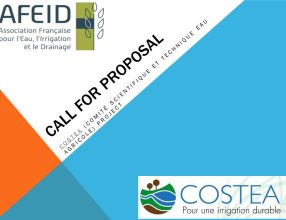
call for proposal: COSTEA (Comité Scientifique et Technique Eau Agricole) project
In the context of the COSTEA (Comité Scientifique et Technique Eau Agricole) project, AFEID will launch a study aiming at elaborating a general framework to organize support to irrigating farmers so as to maximize the outcomes of such activities. This study is part of a broader reflection on “Irrigation Services” held by the COSTEA and will consist of case studies conducted in irrigated areas where organizational and technical innovation in terms of water sharing and commercialization of irrigated products are taking place. The case studies should be conducted in an irrigated-rice production area in Cambodia and in a Tunisian Oasis context. The call is available on AFD DG Market and Expression of Interest should be submitted by May 18 on https://afeid.e-marchespublics.com/ Term of Reference
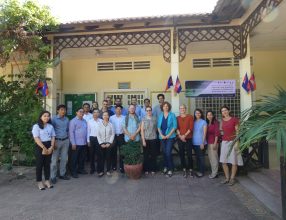
Workshop “Pesticides, Agriculture and Food: Multiple and Growing concerns in Cambodia”
Workshop “Pesticides, Agriculture and Food: Multiple and Growing concerns in Cambodia” Royal University of Agriculture, Phnom Penh, Cambodia, on 28th of November 2019 Organization committee: Eve Bureau-Point (CNRS, CNE), Kimchhin Sok (Ecoland, RUA) Bunsamkaneka Chrin (Ecoland, RUA), Heng Chenghuy (Ecoland, RUA) Organization: CNRS, IRD, Royal University of Agriculture, ECOLAND Venue: Video Conference Room of Graduate School, RUA About the workshop After the chaos generated by turbulent historical events, international aid and market liberalization shaped the reconstruction of Cambodia in the 1990s. This pathway into productivism and globalization, however, also had some unexpected effects, such as the negative consequences of the intensive use of chemical inputs in the agricultural sector. The uncontrolled effects of the agricultural chemicals are better identified and/or recognized, and more widespread globally. Thus, farmers, politicians, input sellers, and consumers, are increasingly questioning how these chemical substances jeopardize the health and the environment. This workshop provided an opportunity to share some recent research results to key stakeholders in Cambodia (from biological, toxicological and social sciences research). Representatives of different ministries will also present some regulation initiatives by the State. Alternative projects to limit the side-effects of the agricultural model based on agrochemistry will also be introduced by […]
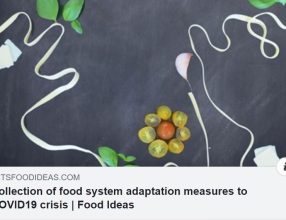
Adaptation measures for COVID 19 related to agriculture and food : Share your experience to help other territories ensure their food resilience!
This questionnaire was built in a participatory manner with different food system experts. The Milan Urban Food Policy Pact Secretariat, as a partner organization of Let’s Food, support us in this initiative. We thank you in advance for your answers, do not hesitate to share this questionnaire, all the answers received will facilitate the dissemination of good practices and innovative solutions to other cities around the world. Click COVID-19 questionnaire
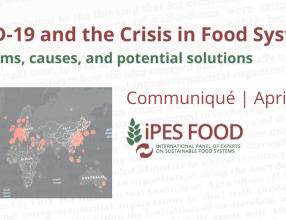
Relevant articles addressing the relationship between COVID19 crisis and the need to transition towards sustainable food systems
The current COVID 19 pandemic is affecting the political, economic, social, environmental and food sectors. This multidimensional threat requires an adequate response to protect the most vulnerable and marginalized group. Hereafter are useful links and articles addressing the relationship between the COVID-19 crisis and the need to transition towards sustainable food systems: COVID-19 and Agroecology reading list A blog that has been put together by FAO with a regularly updated list of articles, information, and reports highlighting how “agroecology” can make our food systems more resilient, rebuild healthy ecosystems and perhaps even prevent future outbreaks like COVID 19. http://www.fao.org/agroecology/slideshow/news-article/en/c/1268856/ FAO invites us to share with them ([email protected]) any articles, publications, and reports that showcase ways to overcome the current crisis through local agroecological experiences. The health of people and the planet are one and indivisible. https://www.organicwithoutboundaries.bio/2020/04/07/health-one-and-indivisible/ Applying the hard lessons of coronavirus to the biodiversity crisis https://www.undp.org/content/undp/en/home/blog/2020/applying-the-hard-lessons-of-coronavirus-to-the-biodiversity-cri.html?fbclid=IwAR3AIMo7mZmEQUf9AyMiHvNkj6Qa5Na4vDv4peHf98-o57tMQajK8jKEji0#.Xn6ur2uPBpw.facebook Agroecology: Farming for a better future https://meta.eeb.org/2020/03/24/agroecology-farming-for-a-better-future/ COVID-19 and the crisis in food systems: Symptoms, causes, and potential solutions https://ali-sea.org/aliseaonlinelibrary/covid-19-and-the-crisis-in-food-systems-symptoms-causes-and-potential-solutions/ Agroecology in times of COVID-19 https://ali-sea.org/aliseaonlinelibrary-dashboard/get/file/Agroecology-in-times-of-COVID-19.pdf Share your experience to help other territories ensure their food resilience! https://letsfoodideas.com/en/questionnaire-covid-19/ United in solidarity, mutual respect and cooperation, we can overcome the huge challenges in front […]
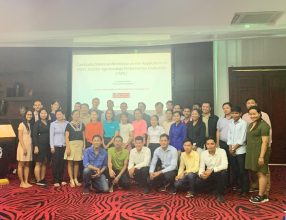
Cambodia national workshop on the Application of FAO’s Tool for Agroecology Performance Evaluation (TAPE), 5-7 February 2020, Cambodia
Background With funding from FAO, Louvain Cooperation leads the implementation of the FAO’s tool evaluation on “Agroecology Performance Evaluation – TAPE”. This project aims to test the FAO tool in Cambodia. The service will contribute to the following organizational objective “stakeholders make evidence-based decisions in the planning and management of the agricultural sectors and natural resources to support the transition to sustainable agricultural sector production systems through monitoring, statistics, assessment, and analysis by using results from the FAO Tool for Agroecology performance Evaluation – TAPE Overview of the training and Field Testing Tentative agenda click Here Training The 2-day training was conducted at Tonle Bassac II restaurant, Phnom Penh, Cambodia. The training was held from 5 to 6 February 2020. There are 28 participants from nine organizations that are working on agroecology in Cambodia participated in this training including Farmer and Nature Net Association (FNN), Life With Dignity (LWD), Conservation Agriculture Services Center (CASC), Eclosio, Chivet & Soil, Mlup Baitong (MB), Ockenden, GRET, and University of Battambang (UBB). The main trainers of this training were Abram J, Bicksler, Agricultural Officer FAO Rome, and Pierre Ferrand, Agriculture Officer (Agroecology) FAO Thailand Half-day field testing Half-day field testing was conducted on 7 […]
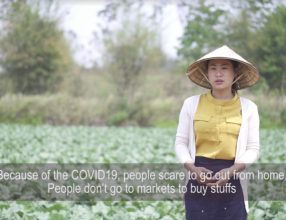
Impact of COVID-19 Pandemic on Farmers in Asia and the Pacific
Original source: http://www.asiapacificfarmersforum.net/ Farmers and fishers are the hardest hit during this global crisis brought by the COVID-19 pandemic. Many countries decided to close their borders for the time being to contain the spread of the virus, and consequently, this affected the livelihood of farmers and fishers. Lockdowns and quarantines resulted in a lack of buyers, lack of transportation for bringing the produce to the market, as well as total closure of marketplaces. Meanwhile, in places where they are allowed to work on their farms, farmers and fishers face the threat of being infected with the virus as they continue to work in open spaces. In these videos, farmers from countries in Asia and the Pacific narrate the challenges they face in this time of crisis. Bangladesh Fiji India Indonesia Laos Mongolia Nepal CLICK HERE TO READ MORE STORIES
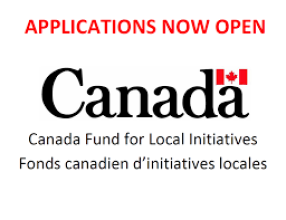
Canada Fund for Local Initiatives – Cambodia, Lao People’s Democratic Republic and Thailand
Program description The CFLI is a program designed to support small-scale, high-impact projects in developing countries, which align with Global Affairs Canada’s thematic priority areas for engagement. The program is directed at projects conceived and designed predominantly by local partners. Projects are selected and approved by the relevant Canadian embassy or high commission. The CFLI also serves to support positive bilateral relations between Canada and recipient countries and their civil societies, by deepening contacts and supporting local endeavours. The average CFLI contribution is C$15,000 to C$30,000 Canadian Dollars (C$100,000 is the maximum allocation amount for a project eligible under CFLI). Consult the currency converter for local currency equivalents. Please note that all contributions are made in Canadian dollars and then converted to the local currency. How to apply The deadline for submission is Friday April 10, 2020, at 23:59 (GMT+7). Applications submitted after this deadline will not be considered. please complete the Canada Fund for Local Initiatives (CFLI) Project Application for Funding Form proposals must be submitted to: [email protected] all projects must be completed between the date of signature of the Contribution Agreement and February 28, 2021. contribution Agreements for selected projects will be signed in May or June 2020 only proposals using the designated […]
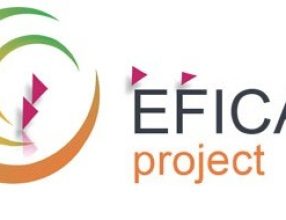
Videos – EFICAS Project
About EFICAS Landscape Management and Conservation Agriculture Development for Eco-Friendly Intensification and Climate Resilient Agricultural Systems in Lao PDR (EFICAS project) The EFICAS Project aims at developing innovative methods and intervention approaches to support farmers’ adoption of climate smart agricultural systems based on conservation agriculture. Over the past decades a large range of technical options have been tested successfully in the northern uplands of Lao PDR to support a sustainable intensification of upland agriculture. For example, diversified cropping systems based on agroecological principles have proved effective in restoring degraded soils and improving agricultural productivity while limiting the use of external chemical inputs. Today, soil conservation techniques are well known by most stakeholders, including village communities, but they are not spontaneously adopted. The reasons for low adoption are often not related to the cropping techniques themselves but to external causes, such as the roaming cattle and buffaloes that damage cover crops, the limited knowledge of existing market outlets, or simply because farmers find it less labor consuming to till their land or to use chemical products instead of organic practices Visit the EFICAS website: https://www.eficas-laos.net/ Videos by EFICAS published in 2020 > How to improve livestock systems? [2020] Farmers experience related to big […]
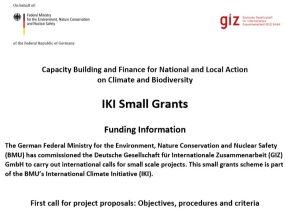
IKI Small Grants “Capacity Building and Finance for National and Local Action on Climate and Biodiversity”
Funding Information The German Federal Ministry for the Environment, Nature Conservation and Nuclear Safety (BMU) has commissioned the Deutsche Gesellschaft für Internationale Zusammenarbeit (GIZ) GmbH to carry out international calls for small scale projects. This small grants scheme is part of the BMU’s International Climate Initiative (IKI). First call for project proposals: Objectives, procedures, and criteria 1. Background Since 2008 the International Climate Initiative (IKI) of the German Federal Ministry for the Environment, Nature Conservation and Nuclear Safety has been funding projects that address climate change, mitigation of greenhouse gas emissions, adaptation to climate change, conserving natural carbon sinks / REDD+ / forest landscape restoration (FLR) and the conservation of biodiversity (https://www.international-climate-initiative.com). IKI projects and programmes are comparably large in scale, calling for integrated approaches of project consortia. Smaller organizations are part of these projects but rather as members of larger consortia. However, the implementation of measures under the United Nations Framework Convention on Climate Change (UNFCCC) and the Convention on Biological Diversity (CBD) also require the dedicated strengthening of the stand-alone capacities of small and local organizations from partner countries. With the IKI Small Grants scheme, BMU, therefore, extends its IKI strategy and outreach to small organisations to encourage […]
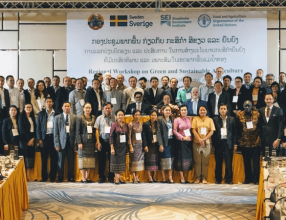
Regional Dialogue Workshop on Green and Sustainable Agriculture
(KPL) Green and sustainable development initiatives and policies enabling the positive transformation of agricultural production systems were shared at a regional workshop on green and sustainable agriculture held on Jan 21-22 in Vientiane Capital, Lao PDR. The workshop, supported by the Stockholm Environment Institute (SEI) and FAO, Ministry of Agriculture and Forestry’s Department of Policy and Legal Affairs, provided opportunities for representatives of government agencies, farmers, private sector, and development partners from Laos and neighboring countries to share insights. The workshop was chaired by Minister for Agriculture and Forestry Lien Thikeo, and co-chaired by FAO Representative to Lao PDR Muhammad Nasar Hayat. Minister of Agriculture and Forestry Lien Thikeo, centre, addresses the workshop Attendees included more than 100 agriculture practitioners and decision-makers from governments, private sectors and NGOs in the Lao PDR and representatives from the Mekong Region (Cambodia, Myanmar, Thailand, and Vietnam). Participants were offered presentations on the national green growth strategy and drafted “Green and Sustainable Agriculture Strategic Framework (GSASF)” and panel discussions to share experiences and lessons learned from perspectives of national and regional practitioners. Participants explored green agriculture in the field by visiting and interacting with farmers to learn their production and marketing techniques at […]
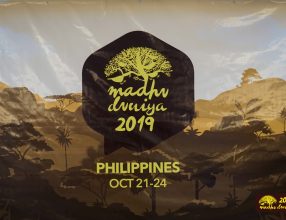
MADHU DUNIYA 2019 IN PHILIPPINES – CONSERVATION AND CHARACTERIZATION: ASIAN BEES UNIQUE BUT THREATENED
Madhu Duniya is the largest gathering of Asian forest honey producers, scientists, supporters and private sector players in the world, coming together to discuss growing trends, challenges and opportunities in the forest honey and native bee sector. It is held once every four years in Asia, and the Philippines has hosted the 2019 edition of the event in October. The event takes its name from the Sanskrit word “Madhu” (Honey) and the Arabic word “Duniya” (World). As a regional platform, Madhu Duniya aims to promote forest honey as a crucial product for rural incomes, a key towards forest conservation, and as a vital component to human health around the world and especially in Asia. Previous iterations of Madhu Duniya held in India (2007), Indonesia (2011), and Cambodia (2015) have been quite successful. It has resulted in the successful formation of forest honey networks in at least five countries, the forging of government partnerships, inspired on-going research on honey for its health and medicinal benefits, and provided links for private sector partners and producers. The Philippine archipelago is home to various endemic and indigenous species of honey bees. In many parts of the country, indigenous and local communities hunt and gather […]
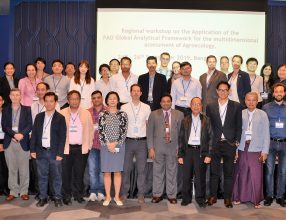
Regional workshop on the Application of the FAO Global Analytical Framework for the multidimensional assessment of Agroecology, 24-26/09/2019 Bangkok, Thailand
The regional workshop on the Application of the FAO Global Analytical Framework for the multidimensional assessment of Agroecology was co-organized by RAP, AGA, and AGPME in the framework of FAO Strategic Program on Sustainable Agriculture (SP2). This tool has been developed as part of the Global Knowledge Product on Agroecology through a multi-stakeholder collaborative process. The objective of the workshop is to introduce this analytical framework to FAO staff in decentralized offices in the region and to external partners engaged in agroecological approaches (CSOs, academia, research institutions, and NGOs) so that they can apply it in their various contexts. This event is seen as coming during a critical moment to fine-tune and contextualize the tool and provide evidence and case studies on the performance of Agroecology across many different dimensions of sustainability. For a Prezi link and presentations are available to download below: Prezi FAO’s global work on agroecology and the scaling-up the initiative TAPE: a Tool for Agroecology Performance Evaluation Selection of territories, farms, and communities for testing the framework Step 0: Description of systems and context CAET: Characterization of Agroecological Transition Regional workshop on the application of the FAO global analytical framework for the multidimensional assessment of Agroecology: […]
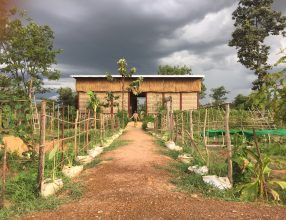
Green Shoots Foundation & CIDO Agritech Centre, North West Cambodia
Green Shoots Foundation and Community-based Integrated Development Organisation (CIDO) have recently established an agriculture-training center in Odar Meanchey, North West Cambodia. Space is a community-learning center, which acts as a training area and demonstration site for a range of activities pertaining to rural development, farmer livelihood and enabling young people to remain acquainted with agriculture. Three main objectives we have identified for the site are: Provide access to vocational training in horticulture, integrated farming, and other sustainable farming practices and technology Improve the practical application of rural development skills in-line with environmental preservation Enhance the capacity of young farmers for enterprise development We carry out farm-management activities on a daily basis below and also offer seminars and workshops to local households on microfinance, nutrition-related to food growing. Activities Demonstration site for: Home garden (budget USD 100) Conservation agriculture Mini-commercial farm with drip irrigation Agroecology Producing natural compost Production and storage of natural pesticide, natural fertilizer and nutritious liquids for fruits and vegetables Permaculture garden showing mixed cropping and reviving “wild” foods Frog-raising Wormery Eco-building via earth construction and bamboo Our staff conducts regular outreach in the nearby village to inform residents about activities, encourage them to visit the center for […]
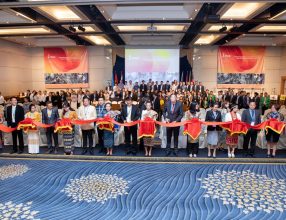
IFAD Mekong Knowledge and Learning Fair (MKLF) 2019, 10-12 July 2019, Bangkok, Thailand
The Mekong Hub Knowledge Learning Fair 2019 (MKLF-2019) organized by the International Fund for Agricultural Development (IFAD), operated by the Hanoi office from 10-12 July 2019 in Bangkok, Thailand. There were different relevant stakeholders and high-level representatives come from different countries, the private sector and producers’ organizations and development organizations such as 1). Country: Cambodia, Lao PDR, Myanmar, Philippine, Thailand, Vietnam, 2). Private sector and 3). Producers’ organizations. Moreover, we observed that there was a representative of the government of Kenya and IFAD country representatives in Africa such as Senegal, Ethiopia, and Kenya. Organizations like GROW ASIA, SEARCA-IFPRI, and CIP-CIAT. The MKLF provided opportunities for participants in IFAD related projects in South East Asia, in particular, the Mekong Region to meet, share and learn. After the Learning Fair, then participants visited the milk cooperatives, beef cooperative, and some other cooperatives as well. There is some presentation about IFAD’s programs and other countries here: “IFAD’s Engagement with the Private Sector in pro-poor agricultural value chain development” “Brewing happiness of partnership Lao PDR” Presentations and photos related to the event here: [Dropbox link]
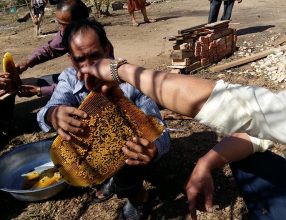
Xieng Khuang beekeepers savour sweet taste of success
Vientiane Times, August 8, 2019 Source: http://www.vientianetimes.org.la/sub-new/Current/Curr_Xieng179.php Beekeepers from four districts in Xieng Khuang province have been able to collect more than 12 tonnes of fresh, natural honey this year following below-average rainfall. This year’s production represents a significant increase from 2018 when Paek, Phoukoud, Phaxay and Khoun districts managed just under eight tonnes of honey between them due to the exceptionally wet conditions. The Agro-Biodiversity Initiative (TABI) of the National Agriculture and Forestry Research Institute, under the Ministry of Agriculture and Forestry, is supporting residents of the four districts to feed bees to produce honey and encourage commercial beekeeping. This year’s yield exceeds TABI’s expectations as bees have been able to collect increased amounts of pollen from flowers, vegetables, and trees. An official with the Xieng Khuang provincial Agriculture and Forestry Department, Mr. Somkhuan Mittasy, said bees found it more challenging to locate food during the rainy season. “Next year we plan to sell 500kg of honey to visitors coming here to celebrate the Plain of Jars being added to the list of World Heritage Sites and attend the 11th National Games in March. These sales will help boost the incomes of local people,” he said. Meanwhile, TABI has been able to […]
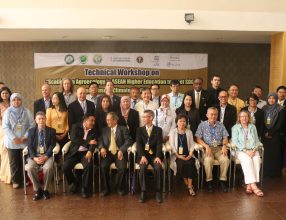
Regional Workshop on “Scaling-up Agroecology in ASEAN Higher Education to meet SDGs and Ensure Climate Resilience”, 26-27 June 2019, Thailand
Regional Workshop on “Scaling-up Agroecology in ASEAN Higher Education to meet SDGs and Ensure Climate Resilience” Hosted by Maejo University (MJU), Chiang Mai, Thailand, 26-27 June 2019, International Education and Training Center (IETC) CONTEXTS With support from the Office of the Higher Education Commission (OHEC) Thailand, Chulalongkorn University (CU) is leading a small multi-disciplinary policy studies and dialogue project on “ASEAN Way Forward for SDGs and COP21 through Social and Sustainability Sciences” contributing to the ASEAN Work Plan on Education (AWPE), 20162020 while Thailand is Chair of the Association of Southeast Asian Nations (ASEAN) in 2019 under the theme: “Advancing Partnership for Sustainability.” REGIONAL WORKSHOP As part of CU’s policy studies and dialogue project Maejo University (MJU) during 26-27 June, 2019 hosted a regional workshop in Chiang Mai on Scaling-up Agroecology in ASEAN Higher Education to meet SDGs and Ensure Climate Resilience” in partnership with CU and ASEAN Agriculture Universities Network (AAUN). MJU generously provided campus accommodation, meals and airport pick-up for all delegates. Participants self-financed air travel were sponsored from their home institutions or received assistance from other donors. Plenary sessions reviewed theoretical and regional perspectives and selected national or institutional case studies. Various participants made interventions which discussed […]
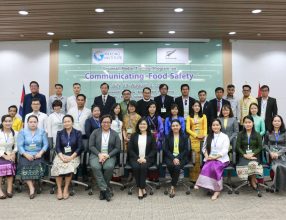
Regional Media Training on Communicating Food Safety, July 29 to August 2, Khon Kaen, Thailand
Original source: http://www.mekonginstitute.org/news-activities/detail/2019/07/30/mekong-media-take-a/ Twenty-eight science journalists and media professionals from Cambodia, Lao PDR, Myanmar, and Vietnam (CLMV) are currently in Mekong Institute for the Regional Media Training on Communicating Food Safety from July 29 to August 2. Speaking at the opening remarks, Ms. Maria Theresa Medialdia, Director of the Agricultural Development and Commercialization Department, highlighted the important role of mass media in putting a spotlight on food safety and raising public consciousness in producing and consuming safe food. “There is a growing demand for safe food in our region, especially due to the increasing cases of foodborne illness and lives unnecessarily lost because of unsafe food and water,” Ms. Medialdia emphasized. “Your role, as science communicators and media practitioners, is to initiate the conversation on why is there a need to prioritize food safety and eventually push both the public and private sectors to adopt improved food safety policies and practices.” Organized under MI’s Promoting Safe Food for Everyone (PROSAFE) Project, the one-week workshop targets to strengthen CLMV journalists’ awareness and understanding of key food safety concepts as well as emerging global and local safe food issues. Among this week’s participants are correspondents from the Khmer Times, National Television of Kampuchea, […]
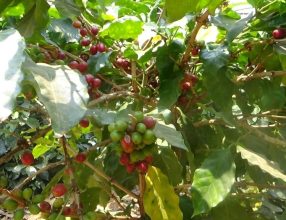
MYANMAR: Coffee farmer boosts income by adding value to organic coffee products
Original source: http://www.asiapacificfarmersforum.net/myanmar-coffee-farmer-boosts-income-by-adding-value-to-organic-coffee-products/ We support our farmers.We drink our farmers' coffee.We love AFFM coffee. Posted by Ctum Myanmar on Sunday, 2 June 2019 In Hpayargyikone village, Myanmar, there are 37 farmer members of the Agriculture and Farmers’ Federation of Myanmar (AFFM), and 32 of them are coffee farmers. U Zaw Myo Naing is one of these coffee farmers. He owns six acres of land he uses in cultivating organic Arabica coffee beans. For many years, coffee farmers in the village sold their coffee to middlemen who then sell the coffee to big companies. The farmers are paid a low price for their produce but this is their only option since they do not have skills on adding value to their coffee produce. Arabica coffee is grown in Hpayargyikone village, Myanmar In 2017, AFFM brought U Zaw Myo Naing to attend a coffee forum in the Philippines. From this forum, he learned techniques on coffee production and how other countries packaged their coffee products. When he went back to Myanmar, he immediately went to work and applied what he learned by adding value to his coffee produce. A traditional style of roasting coffee beans He roasted his coffee beans using the […]
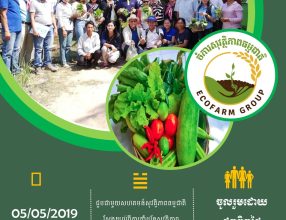
THE CONSUMER DAY
BACKGROUND The consumer day is designed to engage consumers in the chain of vegetable production from the farm to table by taking into account the practices of Ecofarm Group. This event is based on few specific objectives: Raising consumers awareness on safe vegetable production and local food availability Introducing safety and quality assurance system-PGS which had been adapted by Ecofarm group to certify their products Reducing the gap between consumers and producers by creating communication platform that enhance short supply chain for safe vegetables The consumer day had been organized 2 times. The first one was on 26/01/2019, and the second event was on 05/05/2019. The event took place from 8:00am to 3:00pm at the village of Koukreussey Chheung and Chrey Chheung village, Sotrnikum district. 26/01/2019: There were 46 people attended in this event in which 27 of them are consumers, 2 of them are local authority, and 17 people are member of Ecofarm who passed the safe vegetable certification. 05/05/2019: There were 59 people attended in this event in which 32 of them are consumers, 3 are local authority, and 24 are farmers. To attend this event, consumers were encouraged to register their participation here Which was announced on […]
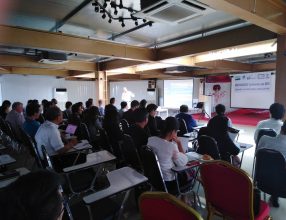
Agri-Business Conference Laos 2019
To feed the world, we need to bring technology and small farms closer together! (Wim Hoogedeure, EY Partner) EY, USDA, Winrock, GAIA Vita and Bureau Veritas has been organized the event on the Agri-Business Conference Laos 2019 at the rooftop of Kolao Building on 25 June 2019. How can we harness all the new technology available today to help build a better working world for an often overlooked, possibly even neglected, sector: Agriculture. Today, many farmers in Laos exist on or are near the poverty line. Farms are going out of business every day. Yet, with a booming population, they are mouths to feed (6.8 millions counted in 2017) than ever. We need farmers, and we need them to be more productive than ever, on a finite amount of land. We believe markets, compliance, technologies and biofertilizers could help solve these challenges. Let us give some examples of how this might work with the Agri-Business Conference Laos 2019. This event gathers the key foreign agriculture investors to meet international speakers representing the key leverages that can change the Agriculture Laos Industry. The below speakers will go through the best practices that will enhance the business of producing, transforming and exporting agri-products […]
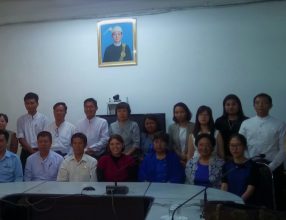
Stakeholder Consultation Meeting: Consumer Awareness on Food Standards in Myanmar
GIZ organized “Stakeholder Consultation Meeting: Consumer Awareness on Food Standards in Myanmar” on 17 June 2019 at Pabedan Township, in Yangon. The objective of the meeting is to facilitate networking as well as the sharing of views, experiences and ideas on how to promote greater awareness on food safety and food standards in Myanmar. The meeting is co-hosted by the Consumer Affairs Department of the Ministry of Commerce (MoC) of Myanmar and the Myanmar Consumers Union (MCU). There were 23 participants from Government Agency, Private Sector and NGO.
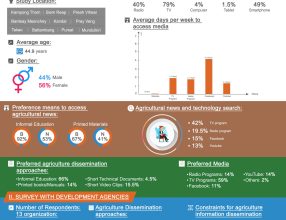
COMMUNICATION MEDIA STUDY IN CAMBODIA
With an increased access to electricity and internet, rural populations in Cambodia currently have better chances to access media on a variety of electronic devices, ranging from TVs, radios, smartphones and many other tools. However, the records of the level of agricultural media accessed by farmers are scarce, while the majority of the populations are farmers. The communication media study was initiated with an aim to contribute to bring this untold situation to light. The study was introduced by Agroecology Learning Alliance in Southeast Asia (ALiSEA) under the support of GRET, and it was jointly developed by 12 ALiSEA Cambodia’s members. The study was developed with 2 main objectives including (1) determining media channels disseminating agriculture knowledge and information that most farmers depend on and how farmers access to those sources, and (2) identifying types of agricultural information and knowledge disseminated to farmers by different stakeholders, and approaches that stakeholders apply to reach target audience. The research covered a period of 5 months from June to October 2018. It started with the meeting with ALiSEA members to plan and develop the research methodologies, data collection and analysis. In the study there were 354 individual farmer interviews in 10 province and […]

Agribusiness on Facebook – CAVAC, 30th May 2019
The Cambodia Agricultural Value Chain programme (CAVAC) showcased the research findings by Quantum Endorphine Digital on access to agricultural information on social media through their ‘Agribusiness on Facebook’ event, which took place May 30 at Sofitel. Gary Ellem, team leader of CAVAC, raised the issues faced when disseminating information to farmers, “There is a lot of migration happening in rural areas, so a lot of the traditional approaches to disseminating information are no longer as effective as they used to be. Particularly for CAVAC, as we’ve increased our work in cassava, we found that farmers that work in outlying areas face particular difficulties with accessing information.” Adrienne Ravez, Chief Operating Officer at Cambodia’s Quantum Endorphine Digital, presented the results from the research, an analysis on 39 Facebook pages and nine Facebook groups. She shared their differences and how to use these tools in conveying information effectively to farmers, providing insights such as how resources mainly cater to commercial purposes currently, with a high demand for professional technical information available for farmers. A panel discussion further looked into the usage of these platforms in aiding local businesses. Mike Gaertner, COO of Sabay, Lim Ngountheng, Digital Marketing Manager of Smart Axiata, Pakk […]
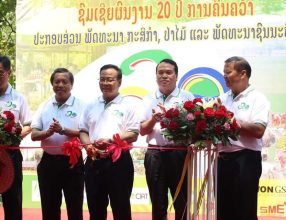
20th NAFRI Anniversary, 25-28 April 2019, Lao PDR
The National Agriculture and Forestry Research Institute of Laos was established in 1999 in order to consolidate agriculture and forestry research activities within the country and develop a coordinated National Agriculture and Forestry Research System. NAFRI belongs to the Ministry of Agriculture and Forestry (MAF) and is equal in status to other technical departments under MAF. NAFRI is mandated to undertake integrated agriculture, forestry and fisheries research in order to provide technical information, norms and results which help to formulate strategy in accordance with the government policies. NAFRI has four main functions including: carrying out adaptive research, developing methods, tools and information packages, providing policy feedback, and coordinating and managing research The most updated mandate consists mainly of the following responsibilities: Develop specific programmes and projects to implement priority programmes set by MAF and the GoL. Playing a central role in land related studies including, land use planning and zoning and land management. Conducting research for germplasm collection and screening, seed/variety improvement, multiplication and other services. Conducting research for the development of effective and demand driven technologies, methods, models and systems for agriculture and forestry production. Gathering, processing, managing and exchanging information and research results with all relevant partners related […]
Search
Categories
- Agro-ecologic School
- Agro-forestry (AF)
- Asia
- Call for Proposal October 2016
- Cambodia
- Conservation Agriculture (CA)
- Country
- Events
- Integrated Pest Management (IPM)/ Integrated Cropping Management (ICM)
- Integrating Farming (VAC)
- Job Vacancies
- Laos
- Myanmar
- News
- Organic Agriculture (OA)
- Philippines
- System of Rice Intensification (SRI)
- Thailand
- Uncategorized
- Upcoming Workshops & Trainings
- Vietnam
